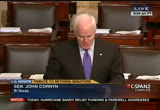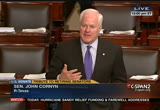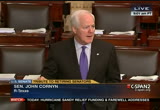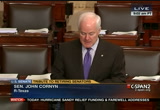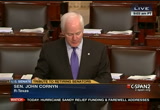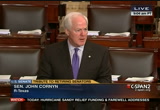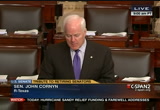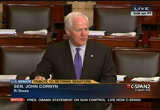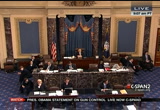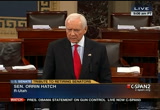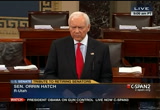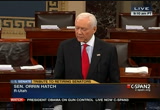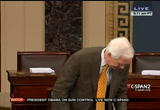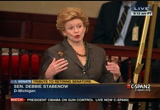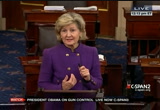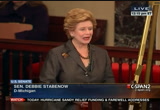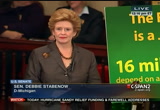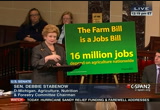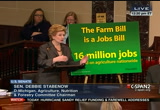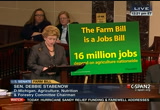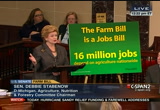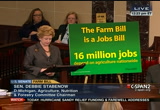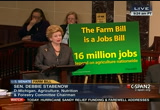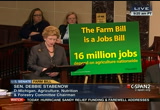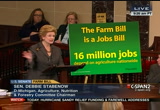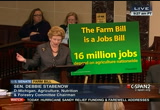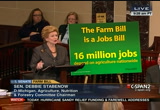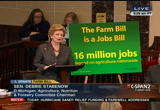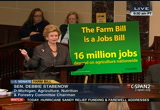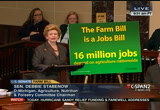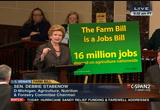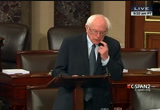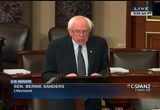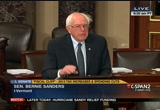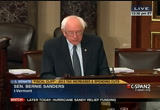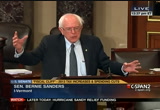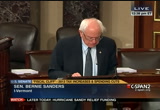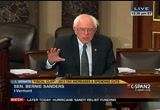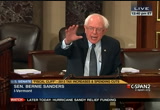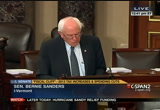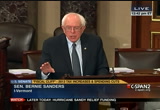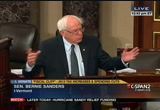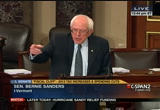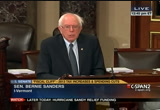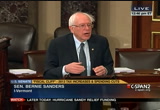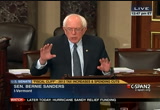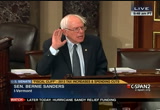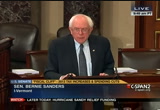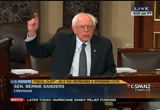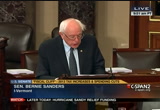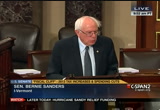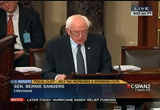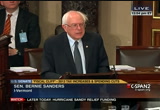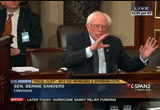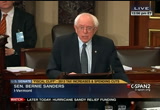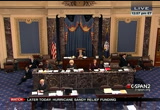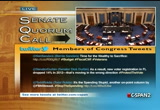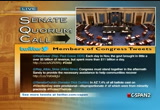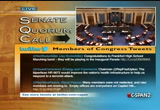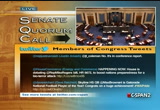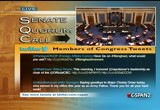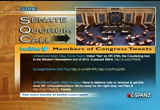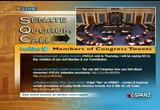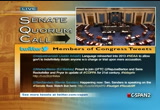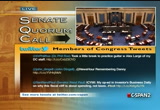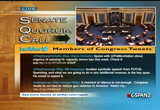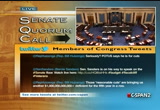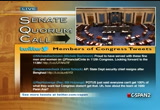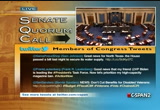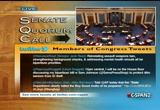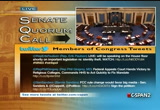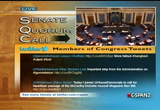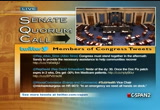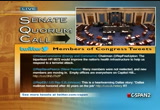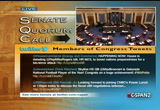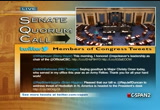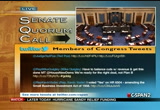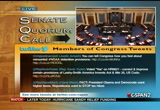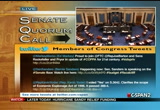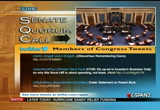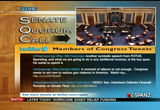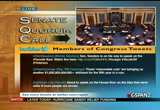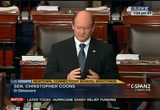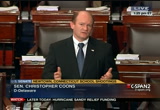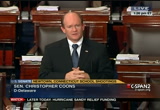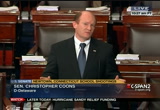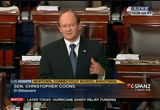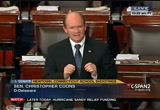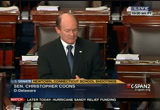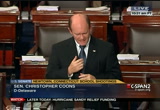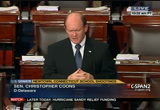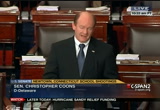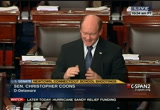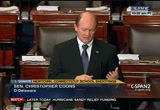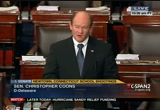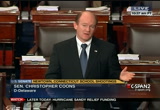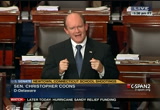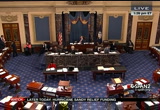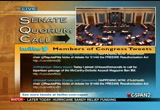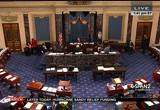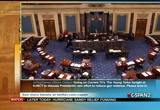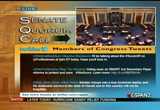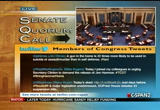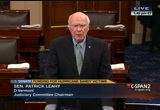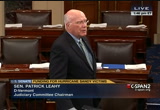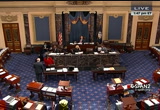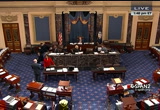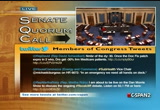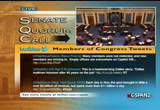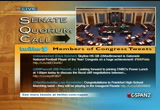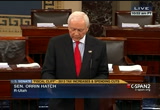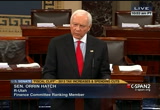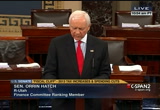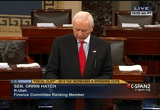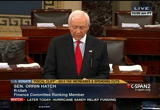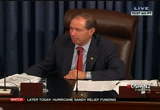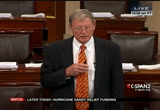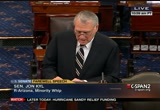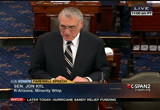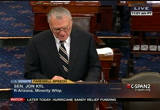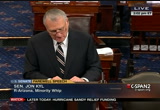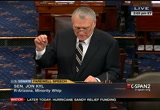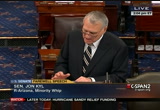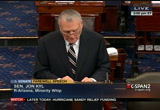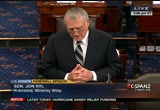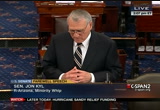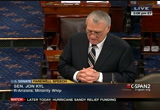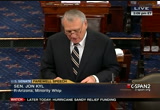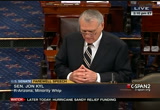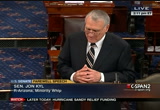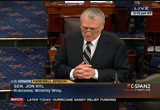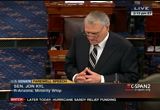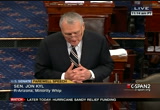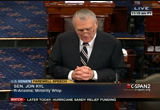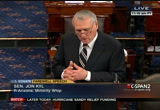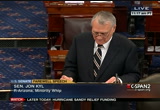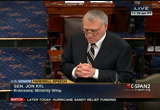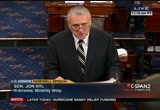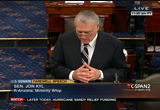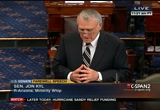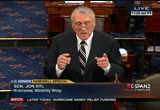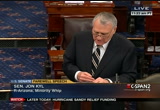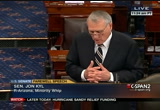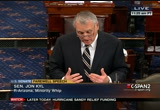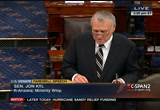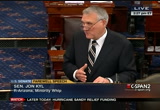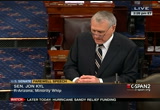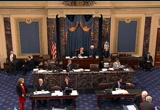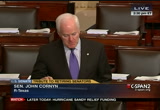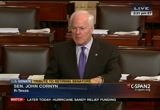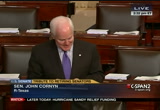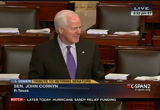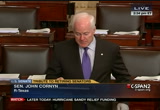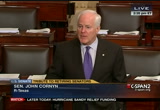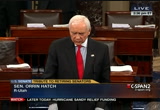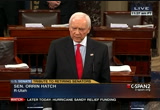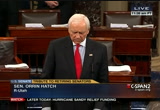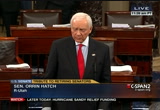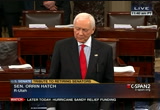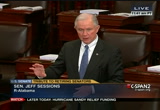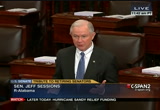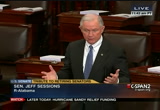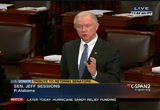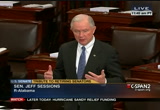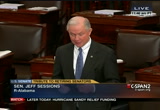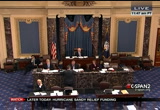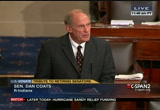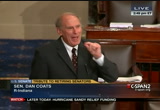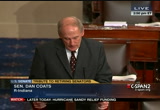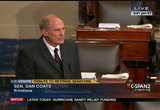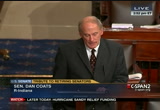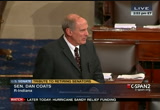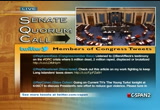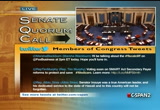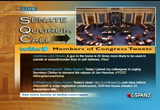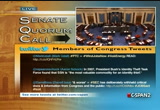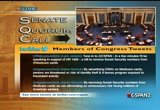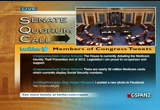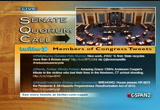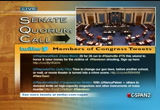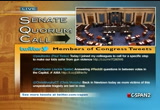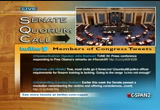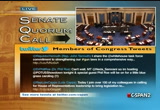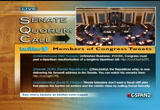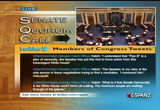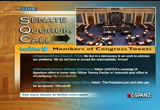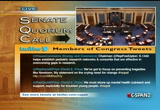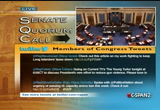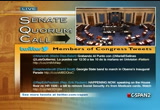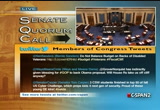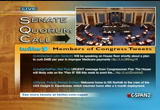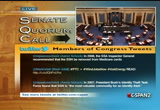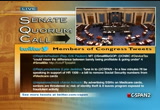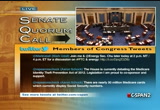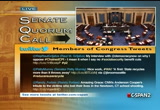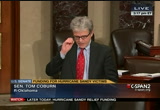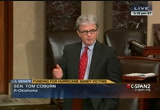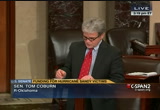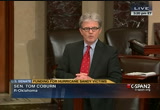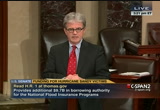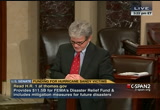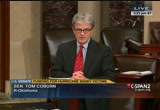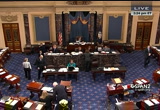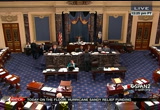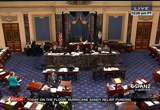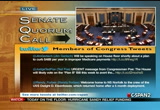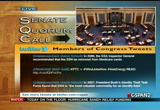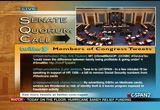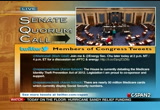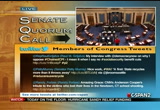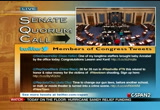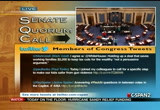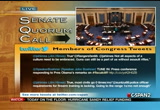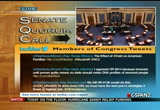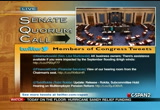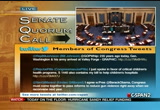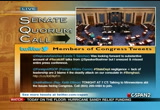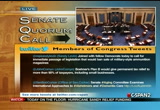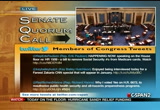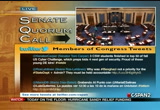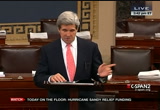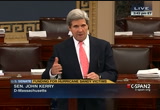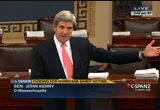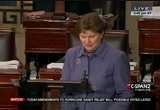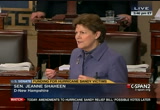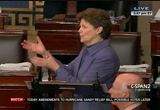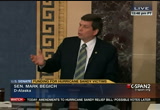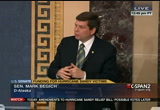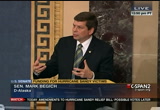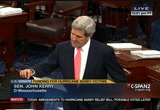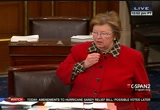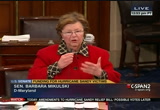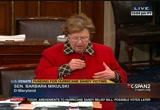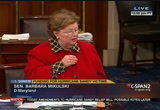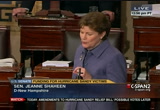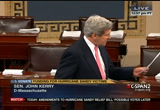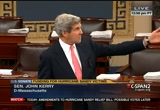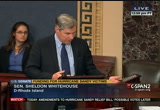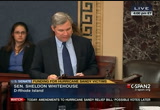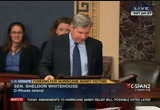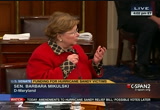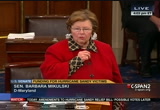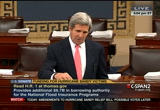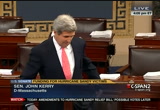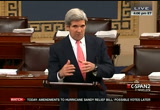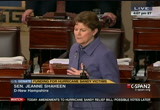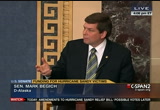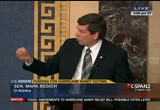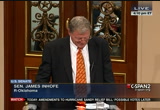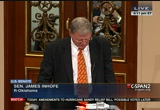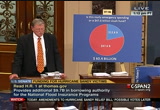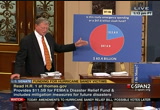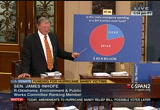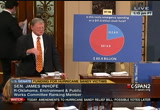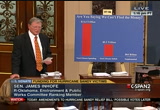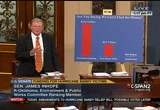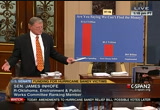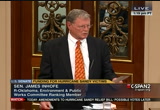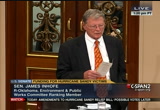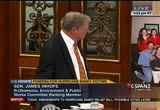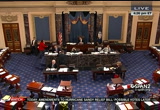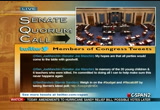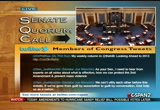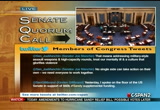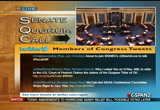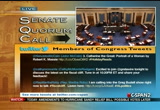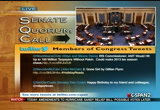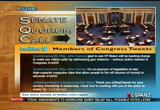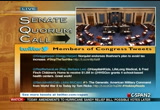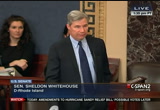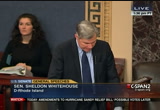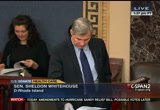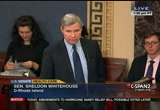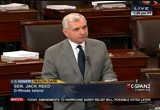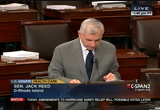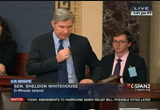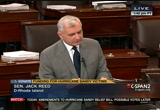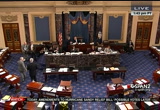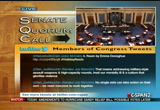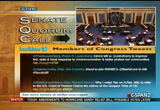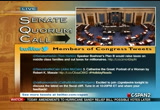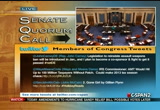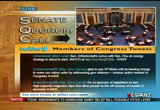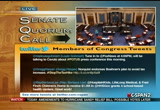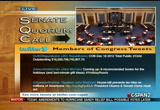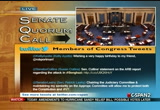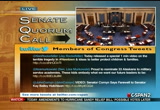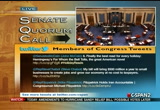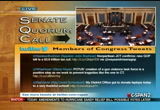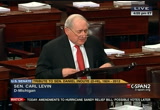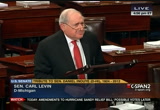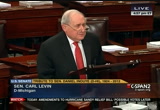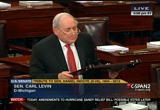tv U.S. Senate CSPAN December 19, 2012 12:00pm-5:00pm EST
12:00 pm
few short minutes, but i'm going to try. i'm going to try to highlight some of her signature achievements and explain why she enjoys such outstanding support from her constituents back in our great state. to start with, i can't think of any senator serving in this chamber who works harder than kay bailey hutchison. sometimes i affectionately refer to her as the energizeer bunny of the texas delegation. she is tireless and she is relentless in her pursuit of what she believes is in the best interest of the constituents in our state. as she mentioned, she has been a tireless advocate for texas military families. we take great pride in the fact that one out of every ten individuals who wears a uniform of the united states military calls texas home and of course some of the most powerful tributes to kay's legacy is what
12:01 pm
i have heard from our men and women in uniform. it's no exaggeration to say that every military base in texas has felt the impact of her work on various senate committees. i know how deeply kay is proud of her work that she's done to help the troops stationed in texas from fort bliss to the red river army depot, which i dare say she pretty much single-handedly saved from being braced the last time that occurred. from shepherd air force base in wichita falls to the tphaeufrpbl air station -- naval air station in corpus christi in the south. not only has kay worked to provide our troops with the resources they need, she's done a lot, a whole lot to help returning veterans and their families. we always talk about supportin -- we always talk about supporting our troops when they're deployed overseas but we
12:02 pm
don't spend enough time discussing ways to help them assimilate into civilian life. as the son of a u.s. air force veteran who spent 31 years in the air force, i'm acutely aware, as coul kay is, that it t just those that wear the uniform that serve, but their families as well. many returning vets and their families encounter a whole range of social and economic hardships that can be hard to overcome. most notably, the unemployment rate among our returning vets from afghanistan and iraq is significantly higher than for the general population, something i know kay has worked on extensively. she's also worked to get our veterans the medical assistance, the job training and the financial support they need. indeed, i don't know of any senator that's done more to help america's heroes adjust to life after the military. that's just one of the reasons why she will be sorely missed.
12:03 pm
here's another reason, though: kay has fought time and time again to promote tax relief for hardworking texas families. in thehooin the mid-1990's, shed create the so-called homemaker ira to make sure that stay-at-home moms and dads were able to save for their retirement on an equal basis with their counterparts who worked outside the home. i now it is one of her proudest achievements and i'm proud to join with the senator from merrell, senator barbara mikulski, in attempting to rename this ira the kay bailey hutchison spousal ira in her honor, and i hope, mr. president, we can join together and honor senator hutchison by getting that done before we close out our business this year. kay, of course, has always championed the state sales tax deduction, which may not seem like a big deal to others in this carriage carriages but it .
12:04 pm
but it is a big deal in texas. we don't have a state income tax. but we do pay a state sales tax. and of course kay has also worked to reduce the marriage penalty tax. she's been a strong defender of taxpayer interests and her efforts have made the tax code less hostile to saving and to families. she alluded to her great work with nasa. she's one of the senate's leading supporters of nasa and human space flight, and of course gnaws i nasa has contribd historic technological breakthroughs that have benefited all americans. kay appreciated the importance of basic scientific research to long-term american prosperity
12:05 pm
and she appreciates the role that nasa has played in fostering innovation. she's long said and advocated for support for nasa because she believes that when we support nasa, we're supporting technologies and the jobs of the future. and that's why she is done so much to help -- and that's why she's done so much to help the johnson space center and our universities support texas as a research state. and of course her beloved university of texas is grateful to her for her support over the years, which is one reason why they will soon be launching the kay bailey hutchison center for latin american law. kay has also crafted legislation that has benefited some of the most vulnerable americans. her work on behalf of the missing -- of missing and exploited children includes the national amber alert network, which she introduced back in 2003. as she said earlier, this law has helped rescue more than 570
12:06 pm
abducted children who would not have benefited but for her work. that's a remarkable achievement and it's more than just a number when you count the human lives that have been so dramatically affected by her work. just a final note, mr. president. as i said, senator hutchison has made history serving as the first woman to serve the great state of texas in the united states snavmen senate. kay has always been a pioneer of sorts. and as the father of two daughters, that means a lot to me. i'm used to being surrounded at home by strong, intelligent women, but serving with kay, i've also been a partner with a strong, intelligent texas woman and, of course, kay has been a role model for so many young women, not just in texas but throughout the united states. i'm honored to be your
12:07 pm
colleague, and aim proud to be your -- and i'm proud to be your friend. cakekay, you leave behind a tremendous legacy of which you and ray and your children can be proud, a legacy that can long be celebrated by texans, from amarillo to brownsville. everyone in this chamber will miss her. i know i speak for all of my colleagues when i michigan wish kay bailey -- when i wish kay billy hutchison the i have best in the next exciting chapter of her life. i join with my colleagues in saying to you, via condios. mr. hatch: mr. president, i want to join in thanking kay for her great service here in the united states snavment i've worked very closely with her on a wide variety of issues and i have to say there's no more fires advocate. in fact, i have to say that all of our women senators are fierce advocates and we've been greatly
12:08 pm
benefited by having them herement and kay has parved the way for -- has paved the way for autumn in of senators, both male and fe female, to become better senators. kay bailey hutch song is a great senator. she worked her guts out the whole time she was here -- and she's still here, but she's going to retire this time. and she represented texas well. and all i can say is that she's been my friend all this time, and when i needed help from her, she was always there. i tried to be there for her when she needed help as well. and i have to say, she has been not only a delightful person to be around, but a very intelligent lawyer and person who fought for what she believed in, most of which i believed in, and she has done so in a way that nobody could really ever get mad at kay bailey hutchison.
12:09 pm
she's a wonderful person, wonderful mother, and we're going to miss her terribly here. this is a body where we could use few more women senators, and maybe a lot more than a few. and they all are very, very good people who work had very, very hard -- who work very, very hard and not the least of whom is kay bailey hutchison. i remember times when i had difficulties with the brac system, i had difficulties with the special nasa problems and so forth. we always worked together. you could always count on her coming up with intelligence solutions to some of the problems that literally should not have existed but did. and i personally have appreciated her very, very much during those times and in so many ways as we've worked together on legislation, as we've worked to help this
12:10 pm
country, as we've worked to represent our respective states. i have such respect for texas and for the people of texas and what they stand for, and i have great respect for these two texan senators, who are two of the best we've ever had in the united states national. kay, you have really been an exemplary senator, not just for women but for all of us. but you've also set some standards that i think both women and male senators are going to have to really try to emulate. i just want you to know that we love you, we appreciate you, and we wish you the very best, and we're going to miss you. this is one senator that will miss you greatly, and i just want you to know that. and all i can say is, god be with you. i yield the floor.
12:11 pm
mr. cochran: mr. president? the presiding officer: the senator mississippi. mr. cochran: mr. president, i am pleased to join my colleagues in commending, congratulating our distinguished colleague from texas. her service here in the senate has truly been outstanding, and she has made an impact in our committee on appropriations, as we deliberated about funding of all of the federal agencies and departments of the federal government. she's been very careful, she's very serious about her responsibilities, and i'm glad to be here today to wish her well in the years ahead and to compliment her on a very distinguished career in the senate. i yield the floor. ms. stabenow: mr. president? the presiding officer: the to sphrr michigan. stab thank you, mr. presidenms., mr. president. first, i rise to congratulate
12:12 pm
and thank a terrific u.s. senator, kay bailey hutchison, and to wish her much success in her further efforts. i know she will provide great leadership in whatever she's doing. it's been wonderful to watch over the years. bailey and houston, as they have grown, to be able to go to baby showers and celebrate and see the pictures and know that on top of all the other accolades today that senator hutchison is a devoted and wonderful mother to two beautiful children. she, as everyone has talked about, is the first and only woman to represent texas in the united states'united states's sl always have that distinction of opening doors and barriers. i know she agrees with me that once the doors open, we want to make sure more women are able to walk through that door as well. and so i want to congratulate her for that you will she has
12:13 pm
done. -- for all that she has come. we've come together to fight for opportunities for woim around -n around the world, the senate caucus on burma and all the other efforts that she has led, and i'm very supportive of adding her name to the spousal ira law. i think that's a very fitting tribute and i'm very supportive and hopeful that we can get that done as well. and so i just want to congratulate her. i do want to have the opportunity to talk about something else, but i would yield. i see my friend wanting to -- wanting to say a few words. mrs. hutchison: mr. president? the presiding officer: the senator from texas. mrs. hutchison: if the gentlelady will yield for a moment to let me say thank you to all of the wonderful senators who spoke and said nice things. it's really one of the few times
12:14 pm
that senators sort of pause and wish someone well, as they are leaving. and it's really been very touching and i am most appreciative. and i appreciate so much the senator from michigan's kind words and just though that it has been a distinct pleasure to have the colleagues on both sides of the aisle to feel that we have done so much together, and my hope is that, as i'm going out the door, that the collegiality of the senate will never, ever change. thank you, mr. president. and i yield the floor. the presiding officer: the senator from michigan. ms. stabenow: mr. president, i also want to speak about the importance of passing a farm bill today and thank the senator from texas for her support as we passed a strong bipartisan farm bill here in the senate back in june and sent it over to the house of representatives.
12:15 pm
we have had 80 days since the farm bill expired, 80 days that farm families and small businesses have been holding their breath wanting to know what's going to happen in rural america. agriculture across the country -- i have not given up or had others here -- my colleagues, certainly my parch, senator roberts here -- certainly my partner, senator roberts here, and our partners in the house all stand ready if we can get a positive significant unti signae republican leadership to get this done. there is no doubt in my mind that we can do that. for everyone listening, the issue is not differences in the commodity title of which we certainly have every confidence can come together and to work out. the question is whether or not as we are seeing efforts being worked on for a larger
12:16 pm
deficit-reduction package, whether the house leadership will think rural america and agriculture are important enough to include. that's the question: whether or not the savings that we have achieved in deficit reduction by eliminating unwarranted taxpayer subsidies and creating other efficiencies in tackling waste, fraud and abuse, whether that is worthy of a priority in the effort that's being worked on. and we have continued to indicate that the 16 million people across america who work because of agriculture deserve to be a priority. i want to thank our leadership and the leadership across the aisle for making it a priority of this senate back in june.
12:17 pm
i want to thank my colleagues in the house on the committee for making it a priority and passing a bipartisan bill in july. and for the life of me, mr. president, i am appalled continually that the republican leadership of the united states house of representatives does not consider the security, the livelihood of 16 million people who live in rural america across this country to be a priority worth including in a final list of things that need to yet be done. now we're not giving up. we're coming back next week and we're going to be here.
12:18 pm
and we are ready at any moment to be able to do what we need to do. and across this aisle, colleagues have worked in good faith in the senate. i'm very grateful. i appreciate the presiding officer's support in urging that we get this done. we have colleagues on both sides of the aisle who have come together to make tough decisions. we are willing to make some more. but we are not willing to give up on 16 million people who live in rural communities, small towns like where i grew up in claire, michigan, who are counting on us to do the right thing and to give them the ability to plan, the ability to get help for the disasters that they have seen, and the ability to know that they can move forward and care for their families. we have a disaster bill right
12:19 pm
now on the floor, and as chair of the agriculture committee, there's no way i'm going to allow a disaster committee without being able to offer an amendment that rethraoeuts agricultural disaster which we have fully paid for in the farm bill. and we're willing to do two tracks here. if we come together, which i hope we will on a disaster package, certainly people in rural america, farmers, ranchers across this country have felt the disasters that other communities have felt. i'm proud to join with senator merkley and senator mccaskill, myself and others putting forward the portions of the farm bill that deal with disaster as a part of this package which is now moving forward. and i hope we're going to have an opportunity to vote on that and come together on that which is so important. that does not negate the need to get a five-year farm bill done
12:20 pm
or a desire to do that. or the fact that we are laser focused until the last moment we have available on getting that done. but let me remind colleagues that farming is the riskiest business in the world. there is a lot of risky things we can do and there's a lot of disasters that have happened. i was pleased to have the opportunity to join with our colleague from new jersey, senator menendez last week to visit some of the coastline in new jersey and to be a part of the group that looked at the devastation there, and there's no question. it's up to our country at times like this when people are wiped out, their homes are wiped out, it's our responsibility to come together and to act on behalf of citizens in those states. and i support doing that
12:21 pm
strongly. it's also our responsibility to acknowledge and recognize and help others around the country who have found similar disasters. and as i said before, there is no business that is riskier than farming. thank goodness we have people that are willing to stay in farming and stay in ranching regardless of what happens on the weather. thank goodness we have a strong crop insurance system in place and we strengthen that even more, which is incredibly important, in this farm bill. but we have had disasters happen that need to be addressed for those who farm for us. in the spring we experienced late freezes in michigan and new york and pennsylvania that wiped out fruit crops. a lot of small family farms,
12:22 pm
farms in northern michigan wiped out. in my home state late freezes in the spring caused cherry producers to lose practically their entire crop right off the bat. it warmed up, the buds came out, then they had a deep freeze; killed everything. our growers produce 75% of the u.s. supply of cherries. that's around 270 million pounds. and the cherry producers experienced 98% loss. now in our amendment, in the disaster bill and in the farm bill, we give them some help because they spent the rest of the crop year this year having to pay to maintain the orchards and the frees, eating the costs and hoping the trees will bounce back next year and produce a crop. so they have all the costs of maintaining everything but no revenue coming in.
12:23 pm
cherry producers were also forced to fight spreading diseases like cherry leaf spot and bacterial tinker, making the trees even more costly to maintain and at risk of loss. they didn't just lose their crop this year. they had to invest a lot of money to save their orchards without having any dollars coming in. we give them some help. it doesn't cover all the loss, but some help to be able to stay in business. we do that through the farm bill. apple producers in most areas of michigan, in new york, pennsylvania had about a 40% normal production. so they lost 60%. that's -- think about a business
12:24 pm
losing 60% of its income per year. or in the case of cherries, 98%. we have things in place to support when that happens. that's why we do disaster assistance. that's why we have other things as well. and we have something called the farm bill when it happens in agriculture, or disaster assistance for agriculture, like we are proposing assistance for. also in the summer we saw record-breaking droughts, as we know. story after story after story of families where crops were left withering in the fields. entire corn crops devastated in iowa. wildfires in colorado killing two people and destroying over 34,400 homes. drought and wildfires cost the state of oklahoma more than $400
12:25 pm
million this year alone according to a report that's just been produced by the oklahoma state university. that includes crops and livestock, property loss from wildfires and emergency costs. i have heard so many times from my friend, the distinguished ranking member from kansas, about what has happened in kansas and have had the opportunity to be there, to hear from people directly in kansas. my staff has walked in the fields to see that there's nothing there because of the droughts and what this means. this year represented the worst drought since 1956. that's a disaster. that's a disaster. the height of the drought this summer, over 80% of the contiguous united states experienced drought conditions. 80%. we still have 11 states with exceptional drought conditions and 17 states with severe
12:26 pm
drought conditions. 17 states across the country, in the northeast, the midwest, the south, the great plains, the southwest and on the west coast, every region except the pacific northwest are suffering from long-term drought. 60% of the farms in the u.s. experienced drought this year, and we saw severe droughts in 57% of farmland acres. by the end of this last october, over half of the pastures and ranges in the united states were rated poor to very poor. and 1,692 counties in the country spread across 36 states were declared a primary disaster area because of the drought. by the way, there's a whole lot of issues around whether you'll
12:27 pm
need to be talking about and dealing with, and need to be doing that in the new year. but this is what is happening for farmers and ranchers. on may 20, only 3% of our corn crop was rated poor or very poor but by the end of september 30, over 50% was rated poor or very poor. our cattle inventories were at a 60-year low as farmers and ranchers have had to sell off their breeding stock because they don't have the hay or grazing land to feed them. low water level in the mississippi is affecting grain shipments, threatening to affect shipments early next year as farmers try to plant their crops. we're seeing reports that grain is piling up at elevators while farmers try to figure out alternative routes of shipping their products to market. hurricane isaac left hundreds of thousands of acres under water. hurricane sandy has caused
12:28 pm
destruction like nothing we could have imagined. as i said, i saw that damage up close for hurricane sandy. weather disasters have destroyed millions of acres of farmland and affected millions of families in every state and corner of this country. we're considering a disaster bill today. the farm bill is a disaster bill because it not only has disaster assistance, but it creates five-year certainty for our growers, who deserve it. they deserve to know what's going to be happening. they deserve to know so they can go into their bank, they can talk about their financing for the coming crop year and be able to plan as well as get immediate help. now, i support passing a disaster bill. and agriculture should be a part of this. but it's not enough.
12:29 pm
we need to do that and we need to have a five-year farm bill in order to create the certainty that we need. we have spent so much time focusing on how we move forward with agriculture today and create the right kind of risk management tools for the future, and i'm very proud of what we've been able to do. and we in agriculture, the committees have also been, frankly, the only committee that has stepped up and said voluntarily we'll put money on the table for deficit reduction. we did it during deficit-reduction talks. we have done it in the house and the senate as we have written the farm bills. we are willing to be part of the solution. we are part of the solution. and one of the things i find very frustrating is that if in fact it doesn't get done this
12:30 pm
year, those who don't want reform, those who want government payments, even in good times, may very well get another year of government payments that we can't afford and taxpayers should not be paying -- paying for. so this really is about do we want reform? i hear colleagues talking on the other side of the aisle all the time about the things we shouldn't be doing, we shouldn't be paying for. well, i would encourage them to join us in the fight to get a farm bill done to stop an area where we have all agreed that we should not be providing government payments in the area of drought payments. now, i know there are those in the house that want to keep that going as long as possible. but it's not right in an era where we have to make tough choices for families in every other part of the budget to
12:31 pm
allow that to happen. we passed a reform bill. we tackled fraud and abuse in nutrition. we consolidated conservation and saved money. we tackled payments that have been given out for years that don't make sense that the government can't afford. and we listened to farmers to strengthen risk management tools, predominantly crop insurance. and with all of the weather disasters i've described this year, if we can strengthen crop insurance, we're going to give them a better safety net going forward for whatever comes in the coming year. so there is a lot on the line, there is a lot on the line for 16 million people who have jobs because of agriculture in the food industry. there is a lot on the line for people who go to the grocery store and eat and want to know that food prices aren't going to go up, that milk prices aren't
12:32 pm
going to go up. there's a lot on the line for people who just want us to come together and work together in light of everything going on. we did that on the farm bill. they did that in the house in committee. all the speaker has to do is say we care about america, we care about rural america, 16 million people who work every day, who are folks that just do their jobs, and when the job has got to get done, whether it's early in the morning, late at night, they do it, and they expect us to do the same thing. there's no excuse, none, none that makes any sense not to get a five-year farm bill done, not to make sure we have the disaster assistance that's needed for farmers and ranchers and not to get the reforms that cut back on taxpayer subsidies we should not be providing and
12:33 pm
the deficit reduction that is critically important as we come up to this fiscal cliff. so i want to thank everyone in this body for working with us to get a bill done that i think we should all be very proud of, and we're going to continue to push as we go forward, hoping that at some moment the house republican leadership will look around at the small towns in their districts and decide that they matter and that they will pass a five-year farm bill. thank you, mr. president. the presiding officer: the senator from vermont. mr. sanders: mr. president, as we continue to debate how to prevent the so-called fiscal cliff and how to go forward in deficit reduction, my republican
12:34 pm
friends apparently want the american people to believe that making the wealthy -- wealthiest people in this country pay a few dollars more in taxes would amount to some kind of terrible, terrible sacrifice, and they are vigorous and unanimous in opposing the president's initial proposal to do away with all of bush's tax breaks for people making over $250,000 a year or more. i guess their new proposal coming out of the house is that only people making a million dollars a year or more would see their tax rates go up. mr. president, let me say a word about hardship and a word about sacrifice, and it is not about the problems of millionaires and
12:35 pm
billionaires who are doing phenomenally well and are being asked to pay a few dollars more to help us deal with deficit reduction at a time when their tax rates are at a historically low rate. let me tell you about sacrifice. let me tell you about who we should not be balancing the budget on. this morning, mr. president, in the veterans affairs committee, i held a press conference which included every major veterans organization in this country, representing millions and millions of veterans, people who have put their lives on the line to defend our country, and many of whom have suffered as a result. the organizations who were there with me to say no to the so-called chained c.p.i. which
12:36 pm
would cut benefits for disabled veterans, would cut benefits for widows and kids who lost their husbands or their father in iraq and afghanistan and would see a chained c.p.i. cut back on their limited benefits. so we had at this press conference the american legion, the veterans of foreign wars, the disabled americans veterans, the iraq and afghanistan veterans of america, paralyzed veterans of america, the blinded veterans association, the wounded warriors project, military order of the purple heart, national military family association, vietnam veterans of america, national guard association, national association of uniformed services, jewish war veterans, military officers association of america, amvets, association of the united states army, commissioned officers of the
12:37 pm
united states public health, naval enlisted reserve association, united spinal association, and what all of them said -- and some of them made this statement far more poignantly than i can, is when you talk about sacrifice, they're there. they have already done that. and some of them have come back from our wars without arms or legs or maybe they lost their eyesight. they have sacrificed. and it is morally absurd to be equating on one hand the sacrifice of a multimillionaire asking him to pay a few dollars more in taxes with asking people who lost their limbs defending this country, asking them to make a sacrifice. that is not equivalent sacrifice.
12:38 pm
mr. president, let me talk about this so-called chained c.p.i. i know that there are some folks out there, i think we have had wall street c.e.o.'s worth hundreds of millions of dollars who were bailed out by the taxpayers of this country who have the most extravagant retirement benefits imaginable, they have come here to washington, d.c., to tell congress that we should cut social security benefits for disabled veterans, raise taxes on low-income workers. so let me just tell you what some call a tweak would do. in terms of the chained c.p.i., more than 3.2 million disabled
12:39 pm
veterans receive disability compensation from the veterans administration. 3.2 million veterans, they would see a reduction, a significant reduction in their benefits. under the chained c.p.i., a disabled veteran who started receiving v.a. disability benefits at age 30 would have their benefits cut by more than $1,400 at age 45, $2,300 at age 55 and $3,200 at age 65. does anybody in their right mind think that the american people want to see benefits cut for men and women who sacrificed, who lost limbs defending their country? are we going to balance the budget on their backs?
12:40 pm
i challenge anyone who supports a chained c.p.i. to go to walter reed hospital, visit with the men and women who have lost their legs, lost their arms, lost their eyesight as a result of their service in afghanistan or iraq. come veterans day, come memorial day, all the politicians go out and give speeches how much we love our veterans. well, it's great to give a good speech on memorial day or veterans day, but what about standing up for them now? i know that the wall street c.e.o.'s and the big money lobbyists are descending on washington, trying to protect the wealthy and the powerful, but maybe now is the time, not just veterans day, not just memorial day that we stand with veterans, we stand with disabled
12:41 pm
veterans. they have sacrificed, and i think it is unseemly, i think it is immoral to be balancing the budget on their backs. we have also made a commitment to the surviving spouses and children who have lost a loved one in battle by providing them with the pendency indemnity compensation benefits that average less than $17,000 a year. do my colleagues really think that we should be cutting benefits for surviving spouses who lost their husbands in iraq and afghanistan? further, mr. president, we have made a promise to every american, and that is that above and beyond benefits for disabled
12:42 pm
vets, that's what we have said is a couple of things. for those who are older, we have said social security will be there for you in your old age, in your time of need or if you become disabled. and we have said that those benefits will also keep up with inflation. today, over nine million veterans receive social security benefits as part of the tens of millions of americans who receive social security, and more than 770,000 veterans receive social security disability benefits. now, we're talking now about the greatvention, the people who save this country in -- the great generation, the people who saved this country in world war ii. it chokes me up every time i
12:43 pm
meet these guys. a fellow from winusky, vermont, who was in the battle of the bulge, that hugely important battle at the end of world war ii to stop the nazi advance. he was also at normandy. do you really want to balance the budget on his back? and we're talking about the brave men and women who served in korea, vietnam and other conflicts as well. let us be clear what this chained c.p.i. would do. i think there are some people -- i guess if you're a c.e.o. wall street guy and you're making millions of dollars a year and you have a great retirement package and you're talking about hundreds of dollars a year, that's what you use for lunch. you don't have to worry about keeping a house warm or buying food. that's not within your world view. under the chained c.p.i., we should all understand this is no
12:44 pm
small tweak, it's not some administrative issue here. under the chained c.p.i., average seniors who retire at age 65 would see their social security benefits cut by about $650 a year when they reach 75. now, again, i understand, if you're a wall street c.e.o., if you're a millionaire, $650 a year is not a lot of money, but let me tell you if you're a senior citizen living in vermont or minnesota and you have got to worry about heating your home, you have got to worry about putting gas in your car, you have got to worry about prescription drugs, $650 a year is a lot of money if you're living on $15,000, $16,000, $18,000 a year income, most of that coming from social security. so a 650-dollar cut from 65 to
12:45 pm
75, it is more than $1,000 a year when you are 85. mr. president, i would ask unanimous consent to be able to put a little chart into the record which talks about annual cuts in social security benefits under the chained c.p.i. the presiding officer: without objection. mr. sanders: what this chart shows, at age 75 the cut would be $653, a 7.3% cut, age 85, $1,195, at 95, 1,695, 9.2% cut. the rich getting richer. we have growing wealth and income inequality in america. the wealthiest people in this country are paying the lowest effective tax rates in decades, and we are going to balance the
12:46 pm
budget on the backs of seniors trying to get by on $15,000, $18,000 a year? is that what this congress stands for? i certainly hope not. mr. president, as i think you well know, the fact of the matter is, is that the current formula for calculating colas is not too generous. and whenever i speak in vermont, i say to seniors and i speak to them quite often, i say, you know, there are some folks in washington who think that your cola, the formulation how we reach a cola for you, is too generous. you know what happens, mr. president? they laugh. they invariably break out in laughter because they they known the last three years, two out of three years they got zero cola and they know this year
12:47 pm
they're going to get a 1.7% cola which is one of the lowest cola increases ever. and they also know that the current formulation for cola does not fully take into account the escalating cost of prescription drugs and health care, which is where most seniors spend their money. they're not spending their money on flat screen tvs or eye phones or -- iphones or ipads. therapy buying food, paying for prescription drugs and paying for health care. those costs are going up much faster than general inflation. i think what most economists would tell you is that the current formulation determining colas for social security is inadequate, too low, rather than as the advocates of the
12:48 pm
chained c.p.i. would suggest, that they are too high. furthermore, mr. president, mr. president, -- and this has not been widely discussed -- moving to a chained c.p.i. would also result in an across-the-board tax increase of more than $60 billion over the next ten years that will disproportionately hurt low-income and middle-income families the most. in fact, two-thirds of the tax increase under a chained c.p.i. would impact americans earning less than $100,000 a year and many would be impacted by losing the earned income tax credit or the childcare tax credit. maybe i'm missing something but i thought i heard on the floor of the senate that we are not going to raise taxes for people less than $250,000 a year. maybe i'm wrong. but i thought i heard that many,
12:49 pm
many times. well, if you vote for the chained c.p.i., in fact, you are raising taxes on a whole lot of people, including low-income working families. under a chained c.p.i. low-income workers would see their taxes go up by 14.5%, mainly by cutting the earned income tax credit and the refundable child tax credit. so if we're going to keep faith with what we have said here, i say to my democratic and republican friends, no tax increases for workers making less than $250,000 a year, we'd better reject this chained c.p.i. furthermore, mr. president, i must tell you that i am disappointed because i thought i heard a few weeks ago my friends in the white house telling us that social security -- telling
12:50 pm
us truthfully, correctly, that social security has nothing to do with deficit reduction because social security is funded by the payroll tax and that social security should be off the table in terms of deficit reduction. i heard that many, many times. so i wonder how social security suddenly has gotten back on the table, including a chained c.p.i. with devastating cuts to seniors and disabled vets. i think we should deal with social security. i think senator dick durbin made a good point. let's deal with it. let's deal with it separately. let's determine how in a fair way we can make social security solvent for the next 50 or 75 years without cutting benefits. i have ideas on that, senator begich has ideas on this, senator harkin and others. and you, mr. president, have been thinking about ways that we
12:51 pm
make social security solvent and strong for 75 years without cutting benefits. let's have that discussion. but not part of a deficit reduction bill when social security has had nothing to do with deficit reduction. i do not often quote ronald reagan, but this is what ronald reagan said on october 7, 1984, and he was absolutely right. ronald reagan -- quote -- "social security has nothing to do with the deficit. social security is totally funded by the payroll tax levied on employer and plea. if you reduce the outgo with social security, that money would not go into the general fund to reduce the deficit, it would go into the social security trust fund so social security has nothing to do with balancing a budget or erasing or lowering the deficit" -- end of quote, wrong, october 7, 1984. reagan was right. and i have to tell you,
12:52 pm
mr. president, that when barack obama was campaigning for president in 2008, he told the aarp on september 6, 2008, that -- quote -- "john mccain's campaign has suggested that the best answer for the growing pressures on social security might be to cut cost of living adjustments or raise the retirement age. let me be clear, i will do neither" -- end of quote, barack obama, september 6, 2008. now, mr. president, one of the astounding things about congress and inside the beltway mentality is how out of touch it is with what the american people are thinking and what the american people are believing. yesterday there was a poll in
12:53 pm
"the washington post", and i would like to submit that to the record as soon as i find it. but what that poll said --. the presiding officer: without objection. mr. sanders: i've got it here. what that poll said, and i hope my colleagues will listen. this is yesterday's "washington post" and absolutely consistent with every other poll that i've seep. 60% of the american people believe it would be unacceptable to change the way social security benefits are calculated so that benefits increase at a slower rate than they do now in order to strike a budget deal. only 34% would find this acceptable. 60% of the american people believe we -- it would be unacceptable to raise the age of medicare eligibility. 70% believe it would be unacceptable to cut spending on medicaid. but -- but 74% of the american people said in this poll that they would accept raising taxes
12:54 pm
on americans with incomes of over $250,000 a year. this is consistent with every other poll that's out there. the american people are saying wait a minute middle-class, the working class is hurting. do not cut social security, medicare, medicaid. that's what they said yesterday in the poll. they also said at a time the rich are getting richer, yeah, they should be asked to contribute more in taxes. now, mr. president, imentioned e best of my knowledge every single veterans organization has made it clear that they are strongly opposed to the so-called chained c.p.i. which would cut benefits for disabled vets. the aarp and the -- the -- every other senior organizations, including the groups that protect social security, national committee to protect social security and medicare, and others, are
12:55 pm
saying do not cut social security benefits. the afl-cio has been very sig russ in -- vigorous in protecting working families and saying do not cut social security, do not cut medicare, do not cut medicaid. so here we are, mr. president. the american people want the wealthy to pay more in taxes and not cut social security and medicare and medicaid. organizations representing tens of millions of people are saying ask the wealthy to pay nor in taxes, do not cut social security and medicare and medicaid and what are we talking about here? we're talking about cutting social security, medicare and medicaid and asking the wealthy to pay more but nowhere near as much as they should be asked to pay. and we wonder, we wonder why congress has a 9% favor ability ability -- favorability rate. mr. president, i will tell you
12:56 pm
my phones today -- and ayotte i don't think this is an organized effort. my phones, you might want to check your office but my office phones are bouncing off the hook. from people in vermont and all over this country saying do not cut social security. so i would say to the american people, right now a deal is being hatched which would cut social security, cut social security and benefits for disabled benefits for disabled veterans, raise taxes on low-income workers. if you think that that is a bad idea, you might want to get a hold of your senator or member of the house. so, mr. president, let me just conclude by saying in my view, deficit reduction is a serious issue. we, as you know, have already cut $1.5 trillion in programs as a result of the agreements in
12:57 pm
2010 and 2011. and up to this point the millionaires and billionaires have not distributed -- contributed up with nickel, one nickel more in taxes. so, mr. president, deficit reduction is a serious issue. i look forward to playing an active role this in making sure we address that serious problem. but i will do everything in my power to make sure we do not balance the budget on the backs of veterans, the elderly, the children, the sick, and the poor, and low-income working people. and with that, mr. president, i would yield the floor. and mention the absence of a quorum. the presiding officer: the clerk will call the roll. quorum call:
1:23 pm
1:24 pm
minutes. the presiding officer: without objection. mr. coons: phr-rpt, i rise today with a heavy heart. when we first heard of the horrific shooting in newtown, connecticut, on friday, it was impossible for me not to react not just as a senator, but as a parent, as a father. and as my wife and i spent the weekend reflecting on the heartbreaks loss of 20 innocent children and 6 of their teachers and faculty, as we talked to our own three young children about what had happened, we thought about the grief, the anguish. a whole range of different parents deeply touched by this tragic incident. the first, of course, are the parents who lost their precious, innocent children. their six- and seven-year olds in the massacre at sandy hook elementary school last friday. parents like joel and joann baker who lost their precocious
1:25 pm
outgoing red-haired daughter charlotte just six years old. joann recently bought charlotte a holiday dress in her favorite color -- pink -- and a pair of white boots. charlotte begged and begged to wear her new outfit early and on friday, december 14, the last day of charlotte's young life, her mother joann agreed. or parents like steve and rebecca kowalski, who lost their son chase. two days before the shooting chase was asked what he wanted for christmas and i understand he pointed to his two missing front teeth. any of us who have had the special blessing and joy of raising young children especially at holiday time can only imagine the unbearable sorry of these -- sorrow of
1:26 pm
these families who now and forever will have a child-sized hole in their hearts and lives. we offer them whatever small measure of comfort we can in knowing that you are not alone, that all across this country and world we pray for your healing and we hope that with time you and your families can come to understand and to live through the grief of this moment. we also think of other parents, parents who raised their young adult children to give back to their community and the next generation by being teachers. in addition to the heroics of the school principal, dawn hochsprung, school psychologist mary other students gave their lives.
1:27 pm
victoria soto and lauren rousseau and their parents taorbgs their families, their -- their parents too, their loved ones are now in our prayers. there's also, i think, in our hearts today the families of the courageous first responders who rushed toward danger as everyone else rushed away. in any emergency, mr. president, as you know as a foremaner attorney -- former attorney general our law enforcement face extraordinary danger. in sandy hook elementary police officers rushed in knowing full well an armed gunman awaited them. what they found was unimaginable. thank god they arrived as quickly as they did or the carnage might have been worse. but we need but reflect for a moment on what those police officers and firefighters and folks from the office ultimately
1:28 pm
found: unspeakable carnage. these heroes could not react as parents, as community members. they had to choke back their own grief and horror to carry out their professional responsibilities, to catalog, investigate and document every detail of this tragic scene so that justice can be done and lessons learned. the scars of those long hours on a crime scene like this last a lifetime. and our first responders all across this country in situations like this bear them with honor and dignity and without complaint. mr. president, this tragedy of course also has ripple effects far beyond sandy hook and far beyond newtown, connecticut. all over this country there are parents whose children struggle with mental illness, with mental health challenges and who don't have the resources that they need to cope. my office has had many calls from worried parents since friday's shooting worried for many reasons, but one that really stood out for me was a
1:29 pm
dad from newark, delaware, whose own child is struggling with mental illness and who is working hard to try and find the resources to ensure appropriate care so that someday he isn't watching with horror on the television as the tragic actions of his child unfold. we think of the story shared online of the mother in idaho terrified that her own son has the capacity to kill some day. and yet, without the ability to give him the intensive medical care, treatment and intervention she believes he needs. across this country, mental health care is a growing challenge for us, between 2009 and 2011, states cut more than $2 billion from community mental health services. two-thirds of states have significantly slashed funding in these difficult economic times leaving parents seeking help for their mentally ill children often with nowhere to turn. mr. president, we must do better for all these parents, the
1:30 pm
parents who lost their children at sandy hook elementary, the parents who lost their children who were teachers and faculty, the parents of those who are first responders and families who struggle with children with mental illnesses and mental health problems. frankly this week, i also think about parents all over our country who have lost their children just as precious and just as innocent as those at sandy hook to gun violence that's outside the media spotlight. the truth is, gun violence knows no boundaries of race or class, but our national response at times seems to. there were 41 murders in delaware alone last year, 28 of them where guns were used as the murder weapon. 16-year-old alexander ca mayor mayor -- camarra was playing at a soccer field in my hometown in wilmington this summer when he was shot and killed in an execution-style public murder.
1:31 pm
dominique helm, age 19, standing with his teenaged cousins on the steps of his brandywine village row house when a gunman opened fire. he stumbled through the doorway and died in his living room as his mother nicole ran to him. stories like these are tragically appallingly common across our country every day, every day 34 americans are murdered with a gun. it happens in our streets and in our neighborhoods. it happens in movie theaters in aurora, colorado, in houses of worship in oak creek, wisconsin. it happens at high schools in littleton, colorado, and a college campus in blacksburg, virginia. it happens outside a supermarket in tucson, arizona, where one of the six people killed was 9-year-old christina taylor greene, a child born herself on 9/11, imbued with a sense of hope and a call to public service who wanted to meet her congresswoman, gabby giffords,
1:32 pm
in order to learn more about public service. they say, mr. president, that nearly 40% of americans know someone directly who has been a victim of gun violence. in christina's case, her father was my high school classmate back in delaware. gun violence touches families, communities and neighborhoods all over this country. so, mr. president, what do we owe these parents? what can we offer their families besides our thoughts and prayers? i believe we must fulfill our central responsibility of protecting the safety of our children and our communities while also preserving the individual liberties guaranteed in our constitution. on sunday night, we watched our president, president obama, speak to a community reeling in shock and grief for the fourth time in his time as president. he asked us as a nation whether we're doing enough to protect our children, and he gave us the
1:33 pm
painfully honest answer, that we did not give ourselves after fort hood, after tucson, after aurora. he said no, we are not, we are not doing enough to protect our own children. horrible crimes like these have a very complex web of causes, including, of course, mental illness. this complexity presents us with a complicated challenge, but the reality is, mr. president, the united states has the highest rate of gun deaths in the industrialized world. nearly 20 times higher than comparable nations. in my view, this calls out for a comprehensive approach for a thorough and searching examination of the causes of this uniquely american crisis, and i believe it requires action by this congress and our president. i have received calls and letters, emails and facebook posts from delawareans around the state, republicans and democrats, doctors and teachers,
1:34 pm
parents and children. they have shared with me their grief and their ideas, and they have called for action. and the united states has a long and proud tradition of independence, of protecting ourselves, of exercising our right to self-determination, of hunting and of a sporting tradition that is enshrined in our second amendment, and we have to recognize the importance, the legitimacy of the concerns of gun owners to know that in the debate that can and will and should unfold in this chamber, that we will respect their right to bear arms and that we will respect and honor this most important part of america's fabric. but every constitutionally protected right has its boundaries, its limitations, and i'm troubled in particular by the thread that ties together too many of these tragic mass
1:35 pm
shootings, that the perpetrator had clear mental health problems, one addressed, untreated mental illness challenges and used military-style weapons and clips that have no place in everyday civilian life. several of my colleagues have already come forward with proposals. senators manchin and lautenberg and warner and feinstein and others. and of all of these, i'll touch on a few. i believe reinstating the ban on high-capacity magazines, focusing on ammunition and on the outrageously devastating impact of military clips and military ammunition, particularly on children across all these incidents. i think we should focus on that and reinstate the ban on high-capacity magazines in the next congress. in addition, senator lieberman just the other day on the floor -- he has been joined by senator rockefeller -- has called for a study to gain better understandings of the
1:36 pm
linked issues of mental health, mass shootings and the desensitization to violence in our culture. president obama has picked that up and carried it forward and is proposing a new commission which the vice president, delaware's own joe biden, will be chairing, and it's my hope that out of this important work we can find a path forward that marries the crying need to deal with mental health issues, with cultural concerns about violence and desensitization with responsible limitations on the excessive use of military-style weapons and clips. last, in my view, we can and must do more to keep guns out of the hands of those with a history of violent crime or demonstrated mental illness. our database system is broken and has to be repaired. at virginia tech, 32 students, students and professors were murdered by a young man who got a gun he should have been
1:37 pm
prohibited from buying. a court had already ruled he was mentally ill and posed an imminent danger, but these findings simply weren't reported to the f.b.i.'s gun background check system. mr. president, that's a travesty, and the parents of those 32 murdered in blacksburg, virginia, should be crying out for justice. we should ensure that no gun sold in this country is sold to someone we know to be dangerous or who possesses a direct threat, who poses a direct threat to innocent american lives. today an estimated 40% of all gun sales -- that's some six million weapons a year -- are sold by unlicensed dealers who aren't required to conduct any criminal background check under federal laws. this is how 12 students and one teacher were murdered at columbine high school in colorado with guns bought from an unlicensed seller. no paperwork, no questions asked. it's my hope, it's my prayer
1:38 pm
that we will work to address this and many other complex but important issues in the coming weeks and months and that we'll consider all these proposals carefully and reach a balanced but effective solution. i'll apply the test of balance to find ways that we can continue to respect our traditions and protect constitutional liberties while still advancing our moral requirement to keep our kids and our communities safe. as parents, we can't help but react with horror at the slaughter of innocent children in their classrooms, and we all have to take time first to grieve with our families and our communities but as policymakers we also have a calling to react to the facts as we see them and in this regard, our reaction will have three stages. we need to reflect, we need to debate and then we need to act. the reflection and the debate
1:39 pm
has already begun. the action is still to come. and, mr. president, i look forward to working with you and my colleagues in the weeks and months ahead to ensure that this time we act. the victims of newtown, connecticut, deserve nothing less. thank you, mr. president. i yield the floor. i note the absence of a quorum. the presiding officer: the clerk will call the roll. quorum call:
1:45 pm
mr. leahy: mr. president? the presiding officer: the senator from vermont is recognized. mr. leahy: mr. president, i ask consent the call of the quorum be dispensed with. the presiding officer: without objection. mr. leahy: mr. president, i know we have senators who talked about bringing amendments to the floor. i wish and i know the distinguished majority leader is trying to get a finite list and a time to vote on it. i would hope that can be done. i would hope the senators who have amendments will bring them up, debate them and vote them up or down so we can get on with this bill. if you're a person whose home has been devastated or your children's school has been destroyed in this storm, or your business is only a pile of rubble, they really find it pretty difficult to see whether it's the united states senate or the other body sitting around saying we may have amendments,
1:46 pm
we may not have amendments, maybe we'll have something that's really not germane to what we have here but we want to make a message amendment. they're saying we're americans, we're americans, we're suffering. do something for us. just as this body always has, whether the disaster has been in the midwest, the west, the northeast, the southeast, the south, we have come together for our fellow americans. mr. president, time is running out, and we should get moving. so i'd urge senators, bring your amendments. if you really think they have merit, if you really think they have anything to do with disaster relief, if you really think it's going to be able to help, let's bring them up, let's fill them up and vote them down.
1:47 pm
we get paid our salaries. i don't know of any senator who has lost his or her home, or his or her business, they're still getting paid every couple of weeks. that's not the case for hundreds of thousands of people. let's start acting to take care of them. mr. president, i suggest the absence of a quorum. the presiding officer: the clerk will call the roll. quorum call:
1:52 pm
the presiding officer: the senator from utah is recognized. mr. hatch: i ask unanimous consent the quorum call be rescinded. the presiding officer: without objection. mr. hatch: i rise to discuss the ongoing situation with the so-called fiscal cliff. to millions of americans, what's happening here in washington must be an absolute mystery. in less than two weeks almost every single taxpayer citizen will surface face a massive tax hike if we don't act. for weeks stephen has been trying to get the president to come up with a fair, reasonable and balanced solution so we don't go over the cliff. the president thinking he has some sort of a mandate after his reelection has been less than reasonable. in fact, this president has proposed more and more spending and more and more tax hikes in his proposals to the spreerk
1:53 pm
while the spreerk is -- speaker to is trying to deal with our $16 trillion debt, now $16.4 trillion. the president just can't take yes for an answer. he must think if he keeps slow walking these proposals, the republicans will get the blame and members of his administration have even revealed that they would be more than happy if we went over the cliff. what kind of cruel christmas gift is that? after the speaker and the president exchanged offers this week, house republicans are looking at having votes on two competing pieces of legislation as early as tomorrow. the first is legislation that passed this body over the summer, deeply flawed legislation that every democrat in this body supported. i should note that i put forward a more commonsense alternative that would have extended all the current tax policy for one year during which time we could undertake a comprehensive overhaul of our bloated, broken
1:54 pm
tax code. i think i characterized it as -- as putting it over for one year and dedicating that year to tax reform which we all know needs to be done. the second piece of legislation that the house will vote on is legislation that speaker boehner has called plan b. a more limited piece of legislation that extends almost all the current tax policy as is in the law today. i understand this plan b is a plan of necessity and while i understand that the speaker continues to negotiate with the president to try and reach an agreement, the speaker has put this forward to force action from this intransigent white house. what does the speaker's plan do? the speaker's plan would provide seamless, permanent tax relief for american taxpayers who earn less than $1 million. for taxpayers above $1 million the statutory rates on ordinary and capital gains income would be set at the level president obama and congressional democrats have insisted on.
1:55 pm
mr. president, my preference is clear. i have legislation that this body voted on in august that shows what i believe is a better path. i oppose tax increases very strongly. and i've said over and over again that we should not be touching tax rates. but i also understand that gimb the -- given the reality that the speaker has to move forward with a plan to force action. is it perfect from my perspective? no, but we cannot let the perfect be the enemy of the good. the speaker in my view is the only person in these negotiations trying to find a resolution. i commend him. i admire him. i back him. and i know he's working hard discussing this legislation with the members of the house republican conference as they move towards a vote. i hope they support this plan. however it turns out at this
1:56 pm
point. if i was a member of the house, i would support this plan. but i'm a member of the senate, and this leads plea to ask, after the house passes plan b and defeats the senate democrats' tax bill, what is it that senate democrats want to do? the house will presumably send its bill to the senate, senator reid and the white house have already said it is dead on arrival in the senate. i find that very curious indeed since so many democrats seemed to have wanted exactly what the speaker is giving them. then they complained that the speaker's plan isn't -- quote -- "balanced"-- unquote despite the fact that the president in a proposal was calling on more stimulus spending and for the continuation of so-called temporary stimulus provisions that the president now somehow wants to make permanent. so i would say to my friends on the other side of the aisle, what is it exactly that you want to do? what is it that senate democrats and the white house want?
1:57 pm
we're all waiting. the american people are waiting. enough of the games. put your money where your smowt mouth is and tell us what you think. it's -- that's -- what you think is better than what speaker boehner is ultimately going to put forward. if i was in the house i would be supporting speaker boehner and frankly, i do support speaker boehner. i yield the floor. a senator: mr. president? the presiding officer: the senator from oregon is recognized. mr. merkley: i ask for regular order with respect to my amendment, 3367. the presiding officer: the amendment is now pending. mr. merkley: i have a modification at the desk and a ask my amendment be so modified. the presiding officer: the amendment is so modified. mr. merkley: mr. president, i ask unanimous consent to add senator franken, senator tim johnson, and senator tom udall as cosponsors to the amendment. the presiding officer: without objection. mr. merkley: thank you, mr. president. i yield the floor.
1:58 pm
mr. leahy: mr. president, i suggest the absence of a quorum. the presiding officer: the clerk will call the roll. quorum call: a senator: mr. president? the presiding officer: the senator from oklahoma is recognized. mr. inhofe: mr. president, i ask unanimous consent the quorum call in progress be vitiated. the presiding officer: without objection. mr. inhofe: it's my understanding at 4:00 senator durbin from illinois will be speaking and i ask unanimous consent i be allowed to speak at the conclusion of his remarks at or around 4:15. the presiding officer: is there objection? without objection.
1:59 pm
mr. kyl: mr. president? the presiding officer: the senator from arizona is recognized. mr. kyl: thank you, mr. president. i am deeply honored to have served for 18 years as arizona's tenth senator and for four terms in the house of representatives before that. now it's time to move on. my successor, senator-elect jeff flake, is a good and honorable public servant who will work hard on behalf of our great state of arizona. and my colleague, john mccain, will continue his long and dedicated public service as well. i appreciate the remarks he delivered here yesterday. i want to say thank you to my colleagues for your friendship. it's been a privilege working with so many of you on both sides of the aisle.
2:00 pm
while it's true that washington would benefit from more civility, the senate behind the scenes is an extraordinarily collegial institution. and i will certainly miss that aspect of the job. i also want to thank my staff, past and present, for working so many long hours, and for spending so much time analyzing the issues that will determine america's future. mr. president, farewell speeches offer the opportunity to reminisce about the past. i don't believe that would be the best use of your time or mine. instead, i'm going to comment on some of the biggest public policy changes america faces and recommend principles to guide the way forward. i was first elected to public office when the reagan revolution was in full swing. maximizing freedom guided the policies of that era with tremendous success.
2:01 pm
my goal, as a public servant, has been to advance and maintain a consensus in favor of the so-called three legs of the reagan public policy stool. one, dynamic growth-oriented economics; two, the social values that make limited government possible; and, three, a national security commitment that emphasizes a strong and sovereign america. in each of the three areas, maximizing freedom and the positive results that flow from that is the goal. turn first to economic freedom. the reagan years showed us that expanding economic freedom should be the north star, the guiding light, of the united states policy because it's the best way to achieve sustained and broad-based prosperity for all. free markets, low tanches and limited government -- low taxes, and limited government allow
2:02 pm
citizens to use their resources and to keep more of the fruits of their labor, to encourage people to start businesses. free markets promote economic well-being for all. cutting taxes at the margins -- that is, reducing the rate of tax on the next dollar earned -- encourages growth. raising taxes can have the opposite effect. nobel economist edward press scott of arizona has found that higher marginal tax rates are the reason europeans work one-third fewer hours than americans. when marginal rates are lower, prosperity flows to other sectors of society, allowing business to create jobs and new products, compete for workers to raise wages and i vest their profits, which can then be lent to other entrepreneurs. everyone gains in a free economy. as john f. kennedy put it, a rising tide lifts all boats. look at what free enpricent pris
2:03 pm
achieved? millions of new private-sector jobs were created and the stock market soared tripling in value over eight years. the lower tax rates and reduced regulatory burden produce add more robust economy and a more robust economy meant more revenue for government. similar resulted attended the tax rate reductions during the presidency of george w. bush. many policy-makers have forgotten these lessons. in 2008, america's score in the index of economic freedom has declined significantly -- i mean, since 2008, to the point where we are no longer considered a free economy as we were then but now, rather, a mostly free economy. that's what happens when you dramatically increase government spending and regulations. and now we're on the verge of a massive tax increase which could
2:04 pm
undermine small businesses and stifle economic growth america badly needs. policy-makers must focus on the basic laws of economic inputs. a faulty view has gained traction in recent years, that consumption fueled by government spending actually creates economic growth. it doesn't. it just moves money around, taking from people who produced it and could productive spend it or reinvest it and giving it to government to spend. scum hon is the wrong -- scomtioconsumption is the wrong. people only change their spending hackettes when they know they will have greater income over time. that's why temporary stimulus tax gimmicks don't work. if the problem with the economy is supposedly a lack of consumption, the government can't solve that problem by
2:05 pm
spending for us. after all, it's our tax money that's being taken out of the economy and spent. and when government borrows, it will eventually have to tax the people to pay back what it has borrowed. there is no free lunch. for the government to spend, taxpayers have to give up wealth that they could have spent or invested. keynesian demand-side economics assumes that the government is more efficient at spndzing our money -- at spending our money than we are. that has been proven incorrect time and again. wise policy-makers will find the right balance between the need for more tax revenue and the need for more economic freedom. they will remember that there is no fixed economic pie that legislators should try to divide. they will remember that labor, capital, and technology -- labor, capital, and technology -- are the real factors that drive long-term economic growth, not government spending. and they will stop shackling
2:06 pm
would-be entrepreneurs and job creators are ever-more burdensome regulations. and here's some more good news about growth-based free enterprise: it's the most moral economic system ever devised. for three reasons: first, it's premised on the truth that success only comes by supplying something to others that they need or want. in the bargain, both sides benefit. second, the system has produced incredible wealth around the world, lifting millions out of poverty. no economic system can come close in helping that many people. so it is the most moral economic system in providing material benefits. but that's only part of the story. free enterprise provides more than increased income and material prosperity. those things help, but they aren't what makes -- what make humans really thrievmen thrive.
2:07 pm
the key determinant of lasting happiness and satisfaction is what american enterprise institute has called "earned success." people are happiest when they do something they are good at, what they create values in the lives of others and genuinely earn their income, regardless of what it is. brooks put it very we will in his book, "earned success gives people a sense of meaning aboutary lives, and meaning is also a key to human flourishing. it reassures us that what we do in life is of significance and value for ourselves and for those around us. to truly flourish, we need to know that the ways in which we occupy our waking hours are not based on mere pursuit of pleasure or money or any other superficial goal. we need no know that our endeavors have a deeper purpose." end of quote. the earned success that comes from doing a job well explains why fabulously wealthy people
2:08 pm
often choose not retire after they've earned their fortunes. they're motivated by the satisfaction that comes from spending the day productively, creating, innovating and solving problem. they're creating purpose-driven value in their own lives and oftentimes tangible value in the lives of others. effect of earned success explained why people who win the lottery often become depressed. because free enterprise presents more opportunities to earn success, it is the most moral economic system ever created. it is also the fairest system because it rewards merit, hard work, and achievement. this is what brought my grandparents to this country, along with millions phs other immigrants -- along with millions of other immigrants. real free enterprise has no place for crony capitalism. the biggest economic favor that
2:09 pm
policy-makers can do for americans is to follow the reagan legacy and support free-market policies that create more opportunity, more mobility, and more earned success, and, therefore, more human flourishing possible for every american. free enterprise is the only economic system that gives us so many opportunities to pursue fundamental happiness and lasting satisfaction. this brings to the second of the -- legs of the reagan stool. the question of values. president reagan devoted his presidency and his entire career and public hive to th life to tn of economic freedom. but that depends on certain cultural underpinnings like marriage, family, and personal responsibility. he understood that family breakdown and social pathologies would ultimately mawk people --y
2:10 pm
make pome more reliable on government, sapping them of individual responsibility and the need to care for others in the family or the community. in short, reagan understood that economic conservatism would not survive, could not survive, unless social conservatism survived, too. the united states has a stronger philosophical attachment to freedom and limited government than any other nation on earth, and yet i also recognize that many cultural trends are working against us. for example, nearly 41% of all american children are now born to unmarried women, compared with fewer than 11% in 1970. without stable two-parent fatherfamilies, the government s more of a burden in caring for these programs. and at some point this makes it harder to maintain a political consensus that favors limited government and economic freedom
2:11 pm
and programs that help people out of poverty rather than entrenching it. why? to quote princeton scholar robert m. george, "limited government cannot be maintained where the limited culture collapsed and families easily dissolve. where these things hangars the health, education, and welfare functions of the family will have to be undertaken by someone or some institution and that sooner or later will be govern governed." in other words, in the absence of two-parent families, the government fills the financial role of the father, to say nothing of the critical roles fathers play. over time, more and more americans have come to rely on the government to provide for their most basic needs, needs a this two-parent families have traditionally supported. and those americans are now competing for increasingly scarce resources. this is not to judge the status of these families or to suggest that it's in any way
2:12 pm
inappropriate for the government to provide the help much it is precisely that we do care that we provide help through government and other institutions. but that is an action to ameliorate the effects of a condition, not to change the underlying condition. i believe we must do all we can to revive the marriage culture, increase family stability, and ensure that more children grow up in a two-parent household, strong families have always been the key to upward mobility and economic security. if we want to remain an aspirational society, a society where children have the opportunities and the resources to pursue their dreams and create a better life, then we must encourage young americans to embrace what ron has consistence and elizabeth sawhill have called the "success sequence." that is very simple: you complete high school, get a full-time job, get married before having kids. you follow that you are
2:13 pm
virtually guaranteed to avoid poverty. the marriage culture is fighting an uphill battle against forces threatening to overwhelm it. everyone who believes in limited government and economic freedom and the real self-worth and well-being of our children should do their part in rebuilding the institution of marriage. no other social cause or campaign is more vital to america's future. when it comes to shaping our culture, we must also improve the quality of our students' civic education. i fear that many american students are graduating from high school and college with only the vaguest knowledge of our founding and our constitution, what it means to be an american. it's hard to defend rights if you don't know what they are or where they came from. schools shape students' views about our priorities as a society and what principles are worth standing up for. instead of teaching history and the fundamentals of america's founding, many curriculums focus
2:14 pm
on small, politically correct topics such as gender, class, diversity, and ethnicity. the entertainment industry and many major media outlets, too, dwell on these topics and lend them outsized importance. these topics tend to be political and they emphasize what divides us. they ignore our common heritage of freedom, equality, self-reliance, human dignity, faith, and community. as whic william bennett recently wrote, "we look at what students are being tawrkts it's ease sigh to see why more of them prefer socialism over free-market capitalism. politics is downstream from the culture." bennett also noted that "plato said the two most questions in society are who teaches the younyoung and what do we teach them?" i believe we need to think long and hard about these two questions. it is time to have serious
2:15 pm
discussion with civics education. if americans don't understand or appreciate the foundations of our republican government, those foundations will gradually erode. and in that sense, political and historical literacy is critical to the preservation of our constitutional freedoms. as president reagan famously said, freedom is never more than one generation away from extinction. we didn't pass it on to our children in the bloodstream. it must be fought for, protected and handed on for them to do the same. moving to the last leg of the reagan policy stool -- national security -- i've tried to follow the reagan legacy of pursuing peace through strength. mr. president, reagan once said "of the four wars in my lifetime, none came about because america was too strong." president reagan knew that weakness tempts aggression, and he believed that deterrence meant making sure -- and this is a quotation from him -- "making
2:16 pm
sure any adversary who thinks about attacking the united states concludes the risks to him outweigh any potential gains. once he understands that, he won't attack. we maintain the peace through our strength. weakness only invites aggression ." mr. president, america's strength remains the best guarantor against major armed conflict between nation-states. while it's not our role to police the world -- and we couldn't do it in any event -- it is also true that we are the indispensable nation to help safeguard liberal values around the world. for america to continue its leadership role, however, we must have a military with both the capability and the flexibility to address a wide range of challenges. and, yes, it means adequately funding the military requirements, among other things, by avoiding the devastating sequestration of necessary defense investments. i'd like to speak to four of our challenges: nuclear pho
2:17 pm
tkepbzation -- modernization, missile defense and transgressional law. for the first time the president placed nuclear disarmament rather than nuclear deterrence on top of the nuclear agenda. ironically more treaties or unilateral actions that take us closer to nuclear disarmament will not help face the nuclear dangers we face today. such actions will only serve to make our allies who depend on nuclear guarantees more nervous while potentially weakening the the -- of u.s. nuclear deterrence. modernization was based upon a commitment to modernize weapons. as that commitment starts to decay, it will become increasingly difficult to rebuild the responsive nuclear infrastructure that even the president agreed is necessary for further nuclear reductions
2:18 pm
as well as the continued credibility of the u.s. nuclear arsenal. note that i said for further nuclear reductions. they are literally dependent upon the u.s. modernization. the new start proceedings made it clear that the nuclear balance between the united states and russia under new start force levels would be stable except, of course, for the huge diversity or disparity, i would say in tactical nuclear weapons that russia enjoys. but under the stability there would be no incentives to strike first during a crisis nor would there be incentives to grow our respective nuclear arsenals in the future. we should, therefore, think very carefully before we contemplate any changes to long-standing u.s. nuclear deterrence policies or pursue further reductions in support of the president's disarmament agenda. we absolutely cannot know for certain that fewer numbers of weapons will make us safer. in fact, henry kissinger and
2:19 pm
brent scowcroft recently reminded us -- quote -- "that strategic stability is not inherent with low numbers of weapons. indeed, excessively low numbers could lead to a situation in which surprise attacks are conceivable." policy-makers would do well to heed the advice of winston churchill, offered in his last address to the united states congress. "be careful," he said. "above all things not to let go of the atomic weapon until you are sure and more than sure that other means of preserving peace are in your hands." against the backdrop of more than 100 million war casualties from conventional weapons in just the 30 years before development of the atomic weapon, churchill's advice is sobering indeed. the second challenge we face is
2:20 pm
with respect to missile defense. recent events illustrate the importance of missile defense in today's security environment. israel's iron dome missile defense protected its population against rocket attacks giving israeli military and political authorities the time and the space necessary to avoid a devastating ground war, which is ultimately what made a truce possible. as secretary of defense panetta said at the time, iron dome does not start wars. it helps prevent wars. elsewhere in the world, turkey has requested nato patriot batteries to protect it against syrian ballistic missiles potentially armed with chemical weapons. meanwhile japan, south korea and the united states recently activated their ballistic missile defense systems in response to north korea's ballistic missile launch, yet another reminder that the threat doesn't standstill. and in response to iran's development of nuclear weapons and longer-range ballistic missiles, nato has agreed to support the deployment of short-
2:21 pm
medium- and long-range ballistic missile defense systems to protect the lion's territory and thereby avoid potential uranium nuclear blackmail. the elements of defense are most appreciated especially by those threatened. we've proven it is possible to hit a bullet with a bullet. we've debunked the cold war argument that missile defenses contribute to a new arms race. since the united states withdrew from the a.b.m. treaty we reduced the number of deployed nuclear weapons from 6,000 under start to 1-rbgdz 700 under -- 1,700 under the moscow treaty to 1,550 under the new start treaty. we must continue to disabuse some of the notion that u.s. vulnerability to the russian and chinese nuclear arsenals is the source of stability when in fact the most important constitutional and moral duty of any president is to protect the american people.
2:22 pm
we've made some progress in deploying missile defenses since the united states withdrew from the a.b.m. treaty in 2002 although we've also squandered opportunities to do more. here are a few challenges for the future. for the past few years the obama administration has consistently reduced funding for missile defense. second it, revoked funding on regional missile defenses that protect others at the expense of protecting the homeland of the united states and developing future technologies. third, the administration has scaled back a number of ground-based interceptor protecting the homeland from 54 to only 30, numbers that do not begin to meet the standard established by the missile defense act of 1999, which required a defense capable of addressing accidental and unauthorized attacks from any source. fourth, the administration has no plans to modernize interceptor that are more than 20 years old.
2:23 pm
that's the technology that's protecting america today. and it's, therefore, unlikely to keep up with future threats. as i said, there's very little funding devoted to new breakthrough technologies that could provide even more effective defenses for the united states such as lasers and space-based interceptor. we should remember as north com commander jacoby explained to congress that no home latin task is more important -- no homeland task is more important than protecting the united states from nuclear attack. finally russian attempts to limit the development and deployment of limited and allied systems. the united states cannot allow russia to dictate to us limits on the capabilities of u.s. missile defenses. if they could be effective against a russian launch, then so be it. that's what it means to protect americans from potential
2:24 pm
threats. if the russians argue that they pose no possible threat, then our missile defense should be irrelevant to them. from negotiations on the new start treaty to threatening the united states and nato tphaepbt to limit our -- tphaepbt to limit our -- in an attempt to limit planned deployments to europe the russians never abandoned u.s. missile defense. the answer is not reset but recommitment to the principle that the most moral way to protect the american people from missile attacks is by missile defense. the third national security challenge i would briefly discuss is the threat of political islam. to defeat an enemy, we must first know the enemy, and that includes calling them by their name. radical islamists who seek to impose their ideology to rule others to govern political, social and civic life as well as religious life, intelligence is key to defeating political islam. foreign intelligence
2:25 pm
surveillance act or fisa and the patriot act are good examples of the tools that we need to know what our enemies are planning, who they are before they strike. these tools cannot be allowed to expire. the patriot act reflects a recognition that investigators charged with preventing acts of terrorism should have at least the same investigative tools as federal agents charged with targeting mobsters or health care fraud. the fourth and last national security challenge i'll mention is the rise of transnational law which poses a serious threat to american sovereignty. our government was founded on the principle that laws should be made through the democratic process, so that the people can hold their legislators accountable. the american people elect their own representatives and, therefore, control their own affairs. that's the theory. americans want the benefits of global cooperation based on widespread acceptance of useful international rules of the road, of course, but such rules, like
2:26 pm
our domestic laws, should be adopted through democratic processes that assure accountability on the part of the legislators. they should tphotd -- not be imposed by international bodies with zero accountability to the american people. the rise of global governments -- governance, i believe, challenges this principle. by global governance i mean the use of multilateral treaties and other agreements to delegate power on matters such as the environment, natural resources and individual rights to do international bodies with broad powers and little or no political accountability. such issues have traditionally been decided by the laws of individual nations, not by international bureaucracies. some treaties would directly implicate u.s. national security, flexibility or capability. one such treaty was defeated by the senate in 1999, the comprehensive test ban treaty,
2:27 pm
which would have jeopardized america's nuclear deterrent by preventing us from ever again conducting tests of our nuclear weapons. we should never give up the right to verify that our nuclear deterrence works. it's critical that we know that our allies who rely on these weapons know and that our potential adversaries know or our weapons will not have deterrent effect. i urge my colleagues to defeat this treaty again should it come up before the president -- before the senate in the president's second term. mr. president, in conclusion, in all three areas that i've discussed here, we've had successes and we've had failures. i think of what margaret thatcher said as she was leaving public office, is that there are no permanent victories in politics. what she meant was you can leave office having upheld your principles and accomplished some of your policy goals that. doesn't mean there will always be a consensus in favor of your
2:28 pm
preferred policies or that your accomplishments won't be reversed in the future. as i look back on my 26 years in congress, my 18 years here in the senate, i'm deeply proud of everything we've accomplished from tax relief and welfare reform to missile defense and nuclear policy not to mention things of primary importance to my state. but i also understand that political victories can be ephemeral because in a democracy debate over these issues never really ends. it's always ongoing. i will miss being involved in these important debates and decisions directly. from now on my role in these matters will be as a private citizen, but i still aim to be involved. it's been an honor, really the privilege of a lifetime to serve. and it is difficult to say goodbye. but i will depart capitol hill with enormous faith in the american people, a profound
2:29 pm
2:30 pm
a senator: mr. president? the presiding officer: the senator is recognized. mr. cornyn: i want to say a few words about our colleague, senator jon kyl. i have always appreciated his comments, his thoughtfulness, his patriotism and his intellectual leadership here in the united states senate, and he will be sorely missed in this institution after 18 years in the senate. i'm sorry that the senate will be losing senator kyl's extraordinary talents, but as he retires from politics at the end of this month, i know that he will remain a powerful force in the world of ideas. "time" magazine named jon one of the ten best senators in 2006. at the time, he said you can accomplish a lot if you're not necessarily out in front on everything, close quote.
2:31 pm
that echoes ronald reagan's comment, one of his favorite slogans, there is no limit to what a man can do if he doesn't mind who gets the credit. over the last 18 years, jon kyl has accomplished a lot in this chamber, and he never seemed to care one bit about who got the credit. when he announced his retirement, "the wall street journal" said jon has been as consequential as any republican in congress over the last decade and a half. that's quite a compliment and thoroughly deserved. as you could tell from his comments, jon has comment a career promoting the reagan legacy. after he leaves, many of us will be promoting the kyl legacy. he is a person of strong principle, a man deep in knowledge of public policy, and
2:32 pm
a person uncharacteristic in politics, a person of remarkable humility. here's how one writer described his unique skill set. senator kyl, he wrote, is one of those rare breeds who seems to make no strong enemies even while holding firm to a consistent philosophy. as you've heard, he has been a leader on things as ranging wide as missile defense to criminal justice to tax policy. one of the things i have admired about senator kyl is he always seems to be among the very most knowledgeable people in any room at any given time on any given topic that's under discussion, and when he speaks, people listen. but he often willingly pushes others into the spotlight rather than himself because he thinks
2:33 pm
tactically how can i advance this policy or this idea, not how can i advance myself in the public spotlight. that's certainly been my experience with senator kyl, but i would add something else. he's also been a courageous intellectual leader. he's consistently led on complex issues that other senators have ignored or neglected or just have a difficulty understanding, complex topics like nuclear modernization, missile defense and transaction law, each of which he mentioned in his remarks just a moment ago. it's not easy to become the senate's top authority on nuclear weapons, but jon kyl is. and it's not the best way to get your face on cable news. not a lot of people -- not a lot of air time given to people who want to talk about such arcane but important topics. i have also watched senator kyl
2:34 pm
over the past couple of years cultivate more junior senators and help them become experts in their own right on all of his favorite issues. as a matter of fact, i attended a meeting on that just today where he was trying to bring along a number of us on the nuclear issue. senator kyl is always thinking about the future, always thinking about the next generation of american leaders and the challenges they will face. jon quoted margaret thatcher, reminding us there are no permanent victories in politics. he understands that the debate over limited government and a robust national defense will never be over, it will never be completely won and hopefully never completely lost. that's why he's worked so hard to educate and courage other younger senators who will be fighting these battles long after he leaves the chamber. as i mentioned earlier, jon kyl
2:35 pm
is tremendously principled. he is a proud conservative. but he is also a fair-minded and enormously effective legislator. last february, "the new york times" declared that -- quote - "he may be one of the rare members of his party who combines the trust of conservatives, policy smarts and forcefulness that are needed to secure deals that can pass." it's been my great honor and privilege to work with jon kyl on such issues as immigration reform and criminal law issues, among others. he is a true patriot, a true intellectual and the greatest sense -- in the greatest sense of that term and a truly effective senator for his state and for the nation. after more than a quarter century of public service, including 18 years here in the united states senate, jon kyl deserves a happy and healthy and successful retirement, but he
2:36 pm
will be sorely missed by everyone here in this chamber. mr. president, i yield the floor. mr. hatch: i have served with jon kyl for his whole time in the united states senate, and he is a lawyer's lawyer. i don't say that lightly. i don't consider many lawyers lawyer's lawyers. jon is an excellent lawyer, one of the best i have met, and certainly one of the best ever to sit in congress. he also doesn't go off the deep end. when he speaks, anybody with brains should listen. plus, he's a tremendous example, not just to some of us older guys around here but to especially the new senators and
2:37 pm
others who come into this body. he has been a pivotal member of the judiciary committee when i chaired it and when we did so many interesting things. he has been a pivotal member on leading to a balanced budget in the middle of the 1990's. jon has argued for that and has argued for these type of fiscal restraints and responsibilities like no one i understand. jon has -- is one of the most honest, decent and credible people i have known in the whole time i have been in the united states senate. he has been an excellent leader for our party. as assistant minority leader and assistant majority leader, he has been a great, great leader in our party, and we have all trusted him because he is a person who is trustworthy. we have all listened to him
2:38 pm
because he's a person worth listening to. we have all shared the pains of this place with him as friends and brothers working together we hope in the best interests of our country. and there is no question in anybody's mind on either side of this floor, when it comes to jon kyl, they know that he is a true american patriot who has done everything he could while he was here to keep this country strong. i have to say i was -- i have always been impressed with jon kyl. i've watched him close up for all these years. but i don't know that i have ever been more impressed than when he led the fight with regard to nuclear weapons, with regard to start. he not only was well informed, he was the best informed, and
2:39 pm
this body should have listened to everything he said. i'm sure most people did. i don't think -- i don't think any of us would fail to try and serve this country to the best of our ability. all i can say in closing is that jon has served this country to the best of his ability and his abilities are extraordinary, and i personally count him as a friend. when i had this very interesting re-election this last time with what seemed like the whole world coming down on me for some reason, one of the first people that offered help was jon kyl, and he came to utah and it meant so much to me. all i can say is wherever jon goes after this is over, they are going to be lucky people to
2:40 pm
have him around. and i just wish him all the success in the world, he deserves it. i hope he and his wife and family who i like very much, i hope that they will just have a wonderful, glorious existence from this day onward. we're going to miss you, jon. we're going to miss your intellectual capacity. i'm personally going to miss your legal capacity. and all of these other accolades that have been given on your way, i will miss those, too. but you have a friend here, and this friendship, in my opinion, is an eternal one, and anything i can ever do for you, i will certainly try because i know you would never ask for anything that wasn't accurate or right. so i just wish you godspeed and just know that there are a lot of us who really, really hate to see you go. i yield the floor. mr. sessions: mr. president? the presiding officer: the
2:41 pm
senator from alabama. mr. sessions: i'd like to associate myself with the remarks of senator cornyn and senator hatch. both of them have spoke eloquently and correctly about the absolutely unique and exceptional contributions jon kyl has made to america and to the united states senate. there is no senator i have admired more, no senator i look to more to decide how to cast my vote. i mean that absolutely as a fact. the words they have used, i am not so eloquent as to say that, but they don't overstate the value of my friend jon kyl. his statement that we just heard is a comprehensive analysis, overview of the current situation of this great public of which we are a part. he meant every word of it, and one of the most remarkable things about it is every vote
2:42 pm
every time an issue came up, those are the values he sought to advance. and sometimes you have to take a step back to gain two steps forward, but senator kyl always had a vision for what america should be. i believe it's the correct vision that we have inherited from our ancestors that's made this country so productive and so valuable, and everything he has done, every effort he has made has been to advance those good values, a great america, a decent america, and he's understood it. when he talks about free enterprise, he explains why that is preferrable to other forms of distribution of wealth. would you rather have politicians distribute the wealth in this country? he can articulate that in a way that emphasizes the moral power of it, the need to have peace in
2:43 pm
a world but how do you have it? do you get peace through weakness or do you have peace through strength? and is nuclear -- the nuclear issues necessary to posture as a strong nation in the world that's resistant and deters attack? yes, it is. he understood those issues. i serve on the armed services committee, jon does not, but he knows more about that issue than i do, and i have found his leadership so valuable because it's a thankless task. people don't want to talk about it, but he has talked about it, he knows it's important, even though no one would give him credit for -- politically for being engaged in those issues, but it's important for america, and he's willing to commit himself to that. and i would join with senator kyl and senator hatch and
2:44 pm
senator cornyn in my admiration for jon's service on the judiciary committee. that is an important committee, and he has been a rock-solid member of it, even though he has been in the leadership so therefore he didn't share the committee, which he would have been one of the great chairmen we have ever had of that committee, but he has moved the committee and brought forth the issues and advocated the principles that are consistent with a great american rule of law. today, we just got word that robert bork died. jon kyl -- and he had a classical view of how the constitution should be interpreted and one i basically shared, for the most part. i think jon has. he understood those issues, he is able to communicate the great richness of the american heritage of law to common people in language people can understand, but he's also
2:45 pm
capable of really the -- reading the most complex legal document and being able to spot problems with it and advocate changes in law that are sophisticateed in the most technical details. so i guess i would have to say senator hatch is correct, this senate in my view has never had a better lawyer than jon kyl. he's argued cases before the united states supreme court in practice days and not many have been a part of that. whether we're talking about the crime victims advocacy efforts he's made over a long period of time here, recognizing that the law should be in existence to advance and protect innocent people against the wrongdoers, and we ought not to become so obsessed with defendants' rights that we don't remember the
2:46 pm
victims who deserve vindication and -- and remuneration for the crimes that have been put upon them. so, mr. president, other things that i could say and other issues that we've joined in that we've fought on, more than one occasion jon has felt something was important, sometimes those issues weren't very popular. but he believed it was important and would rally people and i've joined with him and we've had some good battles. we've won a few that frankly several i never thought we were going to win. but somehow with his legislative skill, his determination, his feisty spirit, we stayed in there and bad things didn't occur, at least from my perspective, that may have occurred otherwise. mr. president, i thank the chair for the opportunity to speak. it's a great pleasure to have served with jon. i consider him -- know the grammar is not perfect, our
2:47 pm
most invaluable senator. so we're going to be losing someone of great national importance, but i know he'll be active. he's got a fabulous wife, carol, i enjoy watching how they interact as a family, hasse the values that reflect the highest qualities of american life. and i thank the chair and would yield the floor. a senator: mr. president? the presiding officer: the senator from indiana. mr. coats: i join my colleagues in rising to pay honor and respect to the service of jon
2:48 pm
kyl, a tribute to his passion for public service and his state of arizona and his country. in this congress for 26 years, i echo all the sentiments and all the words have been said by our colleagues, and there aren't enough adjectives to adequately describe the extraordinary service that jon has provided to this country. i've had the pleasure of serving alongside him in the house of representatives, in the united states senate. two times as some know, i served before and was out for 12 years and came back. in my many years of service here, it's hard to think of a person that has been more influential and been more of someone that i wanted to emulate and to learn from and to look at as a wise counsel than jon kyl.
2:49 pm
he's been described as an influential member of the judiciary and finances committees, yes, he's been an outspoken leader on issues of very significant importance to this country. significant issues, including landmark civil rights -- civil victims rights act, the pro-growth tax policies we've been debating here, patient-centered health care reform, nuclear proliferation, safeguarding our nuclear stockpiles, on and on i could go. jon recently called me to his office and said, you know, there are 13 separate things here that have been the highest priority for me. now, not many senators will tell you that they've got 13 high-prior to issues that they not only are interested in, but have drilled down and a unique,
2:50 pm
dint understanding of those particular issues. and jon said one thing that i want to accomplish before i leave is to make sure that someone will pick up the ball and take the baton and carry on those issues after i leave. that's an extraordinary statement. first of all, the bred and -- breadth and the depth of his engagement and his knowledge which i don't think any one person here, it would take many, to begin to duplicate but also the leadership that he's provided. on issues of significant importance to the future of this country. jon was listed as one of the world's 100 most influential people. well deserved recognition. and in washington he's been labeled as one of the 25 hardest working lawmakers. i can't think of anybody that stands higher in that list than
2:51 pm
jon kyl. my mental image of jon kyl is jon striding through the halls of congress literally leaning into the wind. it is as if there's a 60-mile gale coming into his face and john paul is leading into it with determination, and i see his staff nodding their heads here. it's got to be hard to stay up with jon when he's got his mind on something and he's determined to get something done and he's leaning in liking a ship into a gale, marching forward to try to accomplish his mission. we all say, you know, that when someone leaves here, we're losing someone that maybe we can't replace. that may or may not be true. in my first generation when i gave my farewell speech there were probably a lot of people who said, well, we can find a substitute for coats, that won't be too hard.
2:52 pm
it is true. finding a replacement for jon kyl is a tall task. and it's going to be very, very hard to find someone that has the passion for his service, the intelligence and the knowledge of the issues that he engages in, the leadership qualities that he provides, the counsel that he provides to all of us. jon kyl's the go-to guy. jon kyl is the person you go to to say jon, how do we get this done? what should our strategy be? if you're on board, i think we can accomplish this. i know i'm repeating a lot of things that have been said already about jon and will be said by others here who will come down, but to find someone this grounded in his endeavors is hard to find. jon's also grounded in his faith. his faith in god, his faith in america, his faith in constituents, his faith in this institution.
2:53 pm
not a perfect institution, one which we're struggling in right now, but faith that in the end we are here to do what is best for america. and in the end, we will need to make hard decisions. jon has always been one leading that effort, always one willing to stand up and make those decisions. i count him as a friend and marsha and i wish john, you and carol, all the best in this next chapter of your life. i'm comforted by the fact that you won't be more than a phone call away. and the fact that i'm going to need wise counsel on a number of things. and more than that, that we can retain a friendship which we've enjoyed in our service together, on two separate occasions interrupted by 12 years but i'm looking forward to continuing to enjoy our time together. and just want to wish you and carol not only our thanks, thanks from the people that i
2:54 pm
3:17 pm
objection. a senator: i ask unanimous consent to return to coburn amendment 3371. the presiding officer: without objection. mr. coburn: i ask that the -- the presiding officer: the amendment is pending, sir. mr. coburn: i ask that amendment be modified with the changes i send to the desk. the presiding officer: without objection, the amendment is so modified. mr. coburn: mr. president, i ask at this time that the amendment be divided in the form i now send to the desk. the presiding officer: without objection. mr. coburn: mr. president, i'd like to talk about coburn 3372. actually, that's not the correct one. i'd like to talk about division 1, which has to do with per capita damage indicators and initiating a rule process updated. the state of oklahoma in the last seven years has had more declarations of disaster named
3:18 pm
than any other state in the country. and the standard used to be is if we have an overwhelming disaster that overwhelmed the ability of the state to handle it -- and we've gotten away from that. and this hasn't been updated since 1986. what this amendment does under the stafford act of 1988, the whole purpose of our emergency response was for us to step in and provide assistance when state and local capabilities are overwhelmed. it is clear that in new york and new jersey and in communities that were affected by this latest storm, state and local capabilities have been overwhelmed. it's clearly an appropriate time for the federal government, through the federal emergency management agency, to step in and provide assistance. unfortunately, fema has been declaring an increasing number
3:19 pm
of disasters over the past few decades, including for many storms and many events where the state and local capacities weren't overwhelmed. let me make that statement again. many of the disasters that have been declared were declared when state and local capabilities were not overwhelmed at all. so we're setting with this tremendous debt, we're setting with tremendous deficits, and we're now applying a lower standard than what we should, in my mind, and it's not just my opinion. the g.a.o. has actually studied this. we have a g.a.o. report that says this ought to be modified. and so what we're trying to do is to look at, if you go back in history and look at the reagan administration, on average they
3:20 pm
declared 28 events each year in the 1980's. under the current administration, we are averaging 140 disaster declarations a year. my state, as i said, has had the most fema disaster declarations -- 25 in total. so that what i'm offering isn't necessarily going to be beneficial for my state but it makes great common sense for our country. because if in fact they update the per capita effect, some of those that had been declared disasters in oklahoma probably would not. and let me give you an example. in 2011 we felt a little tremble here in washington from an earthquake. a disaster declaration was declared for virginia after the earthquake that was felt here in
3:21 pm
the capital. but this wasn't a disaster that overwhelmed local capabilities. it didn't overwhelm the capabilities of the regional capital area. it didn't overwhelm the capabilities of virginia. yet, we transferred what were truly responsibilities for the state and communities to the federal government. this per capita damage indicator ends up becoming really problematic for two reasons. first, it was established in 1996, but fema failed to update it. and second, simply using the per capita damage indicator is an unfair way to assess whether or not a disaster has occurred. and let me explain why. if you have a small populated state versus a large populated state, where you have a concentration of people in an area, you won't ever attain it if you have a large population. whereas if you have a small population, you will, with the
3:22 pm
exact same event. my question is: should oklahoma benefit on a per capita basis the same event happen in oklahoma happens in los angeles. and we get declared an emergency, and los angeles doesn't. and that's what's happened to us as we've not updated this per capita damage indicator. it is really unfair for the large and more populous states that we do it that way. all we're saying is take the g.a.o. report and follow some of the recommendations. and what are they? fema to review the per capita damage indicator and initiate a rule-making to modernize it. it would require the fema administrator to update the per capita damage indicator for all the years since 199 by no later than january 1, 2016. we're going to give them over three years to update. second, the amendment requires the fema administrator to report
3:23 pm
to congress on better and fairer ways to assess state's preparedness and capabilities to respond to a disaster. and then finally what i would say is this is really a reasonable approach based on what g.a.o.'s analysis and recommendations were: to encourage fema to update its process for how it declares disasters so that we can reserve and focus more aid on severe disasters just like sandy that's in front of us right now. it's my belief that although this may divide some in this chamber, this is a smart thing for us to do for the country. it's a fair thing for to us do for everybody, every state to treat them all the same instead of advantage the smaller states like my state and take a disadvantage the larger states. i'd be happy to work with the chairman to modify this in a way
3:24 pm
that would meet with his approval, but it's something that's sorely lacking. it's something that's causing us to intercede at times when we shouldn't be and causing us to not intercede at times that we should. and i would yield the floor. a senator: mr. president? the presiding officer: the senator from vermont. mr. leahy: mr. president, i suggest the absence of a quorum. the presiding officer: the clerk will call the roll. quorum call:
quote
3:42 pm
mr. kerry: mr. president? the presiding officer: the senator from massachusetts. mr. kerry: mr. president, i ask unanimous consent that the proceedings of the quorum call be dispensed with. the presiding officer: without objection. mr. kerry: mr. president, i ask unanimous consent that the senator from alaska, new hampshire, rhode island, massachusetts be permitted to proceed in a colloquy for a period of about 15 minutes, with the
3:43 pm
mr. president, i just begin by -- by saying very quickly that there is an amendment that has been brought forward to try to strike from an emergency assistance bill critical aid, aid that is frankly less than it ought to be in order to deal with the crisis of the fisheries, not of one state but of the entire new england region and of other regions in the country, pacific also and other parts of the country that have been hit. the fact is that in massachusetts, we have 77,000 jobs, several billion dollars, several billion dollar industry as part of our culture, part of our history. fishing is vital to
3:44 pm
years by record levels of reductions in our fish stocks, and we have also been hit by federal regulations that are trying desperately to hold onto those fish stocks for the long term and for the future which have regrettably reduced our fishing effort by in certain fisheries 50%, 60%, 70%, 80%. we have fishermen who have their boats, just like a home mortgage, their homes, their family entirely dependent on their ability to bring in revenue, but because of the regulations, they're prevented from going out and doing that because of the reduction in the stock which is a god-given effective nature, just like a drought in the western part of our country, just like a flood which we respond to, just like a fire, just like a storm. our fishermen are the farmers of the ocean, and they provide unbelievable amount of food to the people of our country.
3:45 pm
we want to preserve that. if they are not going to fish for a few years, we want to know that they can come back and fish sometime in the future, and that's what they want to do. so just as we have tied people over in the past in our country, just as in china we went and helped people in small businesses that have been wiped out temporarily to be able to come back, our fishing people deserve emergency assistance to tide them over and help them through this most critical time. i would turn to the senator from alaska and the senator from new hampshire, and ask what that means to the state of new hampshire if she might share with us. mrs. shaheen: my friend from massachusetts understands the challenges we have in new hampshire, as does senator whitehouse from rhode island, because, in fact, fishing is one of the oldest industries that we have in new england. and new hampshire it dates back over 400 years. because we have a much smaller
3:46 pm
coastline than massachusetts and rhode island, we have a smaller -- smaller group of people who earn their living through fishing, but they have smaller boats, and therefore they're more affected by some of the fishing regulations and some of the adverse weather conditions that have affected fishing. about 90% of the fishing that new hampshire's fishermen do is for cod and cod is the species that has been most affected by declining fish stocks. so it's a huge issue for our small remaining fishing industry, and the fact that there is funding to help them in this bill is absolutely critical because without this funding, we're going to lose that industry in new hampshire. we've got 5,000 jobs affected here, $106 million income to the state of new hampshire, and i think it's important to point out that this is a bipartisan
3:47 pm
effort. last week we had a letter with 13 of our colleagues, including senators wicker, murkowski, collins, snowe and brown urging the committee to include this funding in the bill. it's there now. i certainly hope that we're going to see bipartisan support for keeping this funding in the bill. and let me just turn to -- and i know -- mr. kerry: if i could ask the senator from new hampshire, i ask unanimous consent the distinguished are senator from maryland, ms. mikulski, join us in this colloquy and we extend it by 10 minutes. the presiding officer: without objection. mr. kerry: i know the senator from new hampshire wanted to turn to the senator from alaska. mrs. shaheen: we're from new england. senator mikulski a adds further south on the east coast, but this is a bicoastal, as i know senator begich will tell us, it's a huge issue for people in
3:48 pm
alaska also. same problem. mr. begich: in alaska it's even magnified in many ways. if you think of alaska's coastline, three quarters of this coastline is alaska. fishermen have been fishing there not just for the few hundred years of commercial fishing but for thousands of years for 12350eu68. when you think of the valuele of 76,000 jobs directly and indirectly connected to the fishing industry, over $5 billion in revenue stream, it doesn't matter on a commercial fishery if you're over at mcdonald's having a fish sandwich, the odds are it comes from our fisheries. if you sit in the fanciest restaurants around the world, odds are you'll see some of our fish there. it's a bipartisan issue. the disasters that are declared for fisheries in this bill have been declared disasters. they're not some pie in the
3:49 pm
sky, some pork or we sit around and say let's get some money to every state. this is actually declared disasters by our states and the boston -- federal government that need to be funded. in our situation it is even more dire. not just economic impact i just laid out but, you know, elder -- an elder told me one time in urban cities you walk out the door, you go down the street to safeway for your food. in rural alaska, you open your door, what's in front of you, the nature that they see, is the grocery store. so when they have in our case the y.k. delta in the western part of alaska had devastating king salmon fishery loss in the sense of the qawpt of fish. when that fish is not able to be harvested to be put in the storehouses for the winter, the limited cash that they have in an area where fuel costs to heat
3:50 pm
their home are $8, $9, $12 a gallon, now have to go to not only heating they've set aside that cash for, now they have to get food shipped in. so their limited cash is now split between heating their home and putting food on the table. in fairbanks, alaska, which is urban, but outside, 40 below yesterday. so heating the home is not just like turning your heater on after work. it's a whole different ballgame. but they live off the land. it is not some hobby on the weekend, not a sports event. it's where they harvest the food. the senator from massachusetts said it best, we like to say we harvest the ocean. we're no different than any farmer in the midwest or anywhere else. so when the y.k. delta loses king salmon the critical piece of the alaskan community for their food supply, it is real.
3:51 pm
it's not about like we'll go fishing next year. no, this is about do we have enough food on the table to feed. so when i hear people on the other side and others who say this is a bunch of pork and this is a bunch of this and that, they need to come to alaska and i would enjoy them coming right now in the winter at 40 below and see what people have to do. so to me this is such a small amount to make such an impact not only to us but to all the coastal states suffering with our fishery industry. mr. kerry: mr. president, i'd like to ask the senator from maryland if i can, i know the senator from rhode island wants to join in, but the senator from alaska made a really important point, that i think the senator from maryland can speak to very specifically. and that is that this is not some amount of money that got pulled out of the sky and was put in in the dead of night behind a closed door, as some kind of back-door deal.
3:52 pm
this has been thoroughly vetted through the commerce department, through the fisheries, through the committees, through all of the regulators, through the white house, the white house has signed off on this. this is a designated emergency. it has gone through the requests of the governors, the governors have had to submit their data, it has all been through the process and i'd ask the senator from maryland because she is responsible on the appropriations committee for making these judgments and there isn't a senator here who wouldn't agree that she does that with rigor and with standards, i'd ask her about what the meaning is number one to the state of maryland which has fishery industries but number two, to the legitimate process of the united states senate. ms. mikulski: i thank the senator from new england and i'm happy to answer his question. and to join here with my fellow coastal senators. first i'd like to respond in my official responsibility in the senate which is to chair the subcommittee on commerce,
3:53 pm
justice, and science. it is in that subcommittee that the agency noaa, the noaa -- the noaa noaa is -- the national oceanic and atmospheric administration is funded. it is there the fisheries money is spent. and any fishery disaster in order to qualify for federal assistance must be certified by the secretary of commerce. every single fisheries disaster in this bill has been certified by the secretary of commerce to meet compelling human need, economic necessity, and within the criteria established by law. the gentleman from oklahoma, well intentioned, is asking us to violate the law. he wants to make fisheries disasters under the stafford act. the stafford act, named after
3:54 pm
tax reform new hampshire, a wonderful -- the gentleman from new hampshire, a wonderful republican, was for fema. if you think you have a fema disaster, you go to the governor, there has to be data collected, it has to go to the president. if you think you have a fisheries disaster, which we coastal senators experience these days all too often, it has to go through the secretary of commerce. and i assure those of you on the floor, those of all senators and all taxpayers listening, every one of these fisheries disasters has been certified, that had been vetted to really say that in each and every state where we respond, it meets this criteria. now, as to the money in the bill, in a $60 billion bill, this is $150 million. $150 million. and listen to the jobs.
3:55 pm
listen to the economy. listen to people who go out and really -- in really cold weather and put their hands in that icy water and they all risk their lives. you know, everybody wants to go see the movie "triple storm." we can't have a triple storm here in the senate which is this amendment, rejection of the urgent supplemental and the inertia of the senate. so i say to my colleagues, your words are well spoken in the defense of your state but you are also exactly following the law. i urge the gentleman from oklahoma to withdraw his amendment because it would make it out of compliance. and i say to each and every one of you as a fellow coastal senator, i know that our fishing industries, you call them fishermen, we call them watermen, whether it's oysters, crabs, rockfish, it's part of our economy and
3:56 pm
it's part of our identity. and they ask for help. so i will oppose the gentleman from oklahoma's amendment, i actually would ask him to withdraw it because it's not a matter of debating policy, how to be a smarter, more frugal government, it's actually in violation of the current law. i thank you for standing up for your own communities, and i hope this clarifies this bizarre situation. a senator: will the senator from maryland yield for a manipulate? the presiding officer: to the gentlelady from new hampshire. mrs. shaheen: isn't it true since 1994 federal fishery failures have been declared on 29 different occasions and nearly $827 million in federal funding has been appropriated for fishery disaster relief? ms. mikulski: yes, the the -- the gentlelady is exactly right and it happened under both republican and democratic
3:57 pm
senators. so had you it declared under president bill clinton and we worked with his secretaries of commerce, this was done under george bush, secretary gutierrez himself from a coastal state of florida, we worked very well together, because the appropriators and the governors and the people have to work together with senators and the answer is yes. the present -- and, again, you cannot get fisheries disaster assistance unless it has been certified by the secretary of commerce in compliance with the criteria in current law. mr. kerry: could i just take 30 seconds? i just want to make it clear to my colleagues as we engage this colloquy, i asked at the beginning of it if one of my staff folks would go and cheng czech out some figures for me and i just got them and i hope the senator from oklahoma is listening to this because just from 2004 to 2011, seven
3:58 pm
years, the federal emergency management agency region sixs which which includes texas, oklahoma, arkansas and louisiana and new mexico, that's one, 3rbgs two, three, four, five states, received 68 disaster declarations and almost $40 billion in disaster assistance. for five states, $40 billion. we have more than five states, many more here, asking for $150 million. as the senator from maryland has pointed out. the distinction is so clear. i just say point blank, this legislation is not going to pass without the inclusion of this fishery money, point blank and period. i thank the senator from rhode island would agree with me. mr. whitehouse: i'd be delegated to -- delighted to agree with the senator from massachusetts. our fisheries disaster as the
3:59 pm
senator from maryland declared, this is a declared, this is not a maybe, it's a declaration of the united states government. it's the multispecies ground fish disaster that affected the state of massachusetts and great leadership from senator kerry on all of this and affected the state of new hampshire and great leadership from senator shaheen on all of this. governors of rhode island, of massachusetts, of maine, of new hampshire, of new york, and of connecticut all signed the request for that disaster declaration. and in rhode island's letter, our congressional declaration, myself and my senior senator, senator reed, congressman cicilline, congressman langevin, wrote in direct impact to catch limits, there will likely be indirect impacts on other fisheries that the same permit holders and other rhode island fishermen rely on.
4:00 pm
to the point senator begich of alaska made, economically, the disaster and in the fishing through cascades through the rest of our economies. it's not just the fishermen coming home with empty nets, it's also the fuel suppliers to their boats, the engine repair shops that take care of the mechanics, the net repair and construction groups and so a whole economy economy stands on this. and it is really unconceivable that a senator from a state that is one of a group of five soaked up -- what was the number? $40 billion in disaster relief? would now begrudge us 150 million after this disaster has been declared. this was bipartisan. let me ask to put actually into the record, if i may, mr. president, the letter that senator shaheen mentioned earlier as an exhibit for the end of the colloquy. the presiding officer: without objection. white houswhite house couldn't e
4:01 pm
mr. whitehouse: couldn't be more bipartisan. our fisheries are facing really significant cuts in our catch limits because the populations aren't rebounding the way the scientists anticipated that they would. something out there is causing this failure to rebound. and unprecedented environmental changes, very related to the environmental changes that whip up giant storms like sandy, are at the heart of this. one last quote, then i'll yield book to my colleagues. where we are is a big body of water called the northeast shelf large marine ecosystem, which is tracked by noaa, and it extends from the gulf of maine all the way down to cape hatteras on our atlantic coast. here's what noaa reports. "during the first six months of 201, se12, sea surface temperats were the highest ever recorded. above-average temperatures were found in all parts of the
4:02 pm
ecosystem from the ocean bottom, to the sea surface and across the region." so there is a real physical rationale and reason for the disaster that we are seeking a remind did i for for our home state industries that are being so grievously stricken. mr. kyl: mr. president? ms. mikulski: mr. -- can he can he how muc can he can he how mucmr. kerry: how mue have left? we'll keep going. ms. mikulski: could i draw the distinction between the fisheries and an earmark. because there is an undercurrent here from the gentleman from oklahoma's amendment, who says and in many occasions has been the defender of the taxpayer, well, so am i. a understand thand the differenn army is a congressionally designated project that meets the criteria that that senator deems appropriate to help his
4:03 pm
state. that's not what this is. so when he says it's got to be certified by the stafford act, he's implying that these are uncertified, unneeded, unwarranted earmarks. well, i will once again say, these are certified by the secretary of commerce, they meet the criteria for compelling economic and human need, as required by law. this is not an earmark. it is certified disaster assistance. let's get rid of this phony baloney here that somehow or another wants to undermine a modest part of this bill of $150 million that could restore livelihoods for people who are willing to work out there and risk their lives to feed america. mr. kerry: mr. president, it is moo understandin my understar time is just about up? could i ask for five more
4:04 pm
minutes. the presiding officer: without objection. mr. kerry: i would just take one more minute and then yield to my colleagues. i thank the senator maryland for that very, very important distinction. i want to say to the senator from oklahoma -- the other senator from oklahoma -- i think all of us have enormous respect for him and for his intelligence and for the way in which he seeks to protect taxpayers and cut pork and get rid of earmarks. we all respect that. and there are legitimate moments when it's appropriate to do that. i think the senator may have either not known or not been aware of all of the details that have been laid out here, and i would plead with him to take a look at the legitimacy of the law and the way in which this has been set up and hopefully withdraw his amendment. i will also say to all of our colleagues at this moment, you know, when we're struggling with the fiscal cliff -- it is the holly time, there ar-- itis the. there are a lot of people
4:05 pm
struggle manyining in america. in a moment where we all have to stop and think what is important and what our responsibilities are, it is really hard for me to grapple onto the notion that in a moment that could be a change in attitude and where people could really begin to perhaps find a constructive way to work together, that we -- that so many people in so many places who are living by the law, who are dependent on this profession and who want to stay in it and return to it because it's part of their lifetime are not going to get help on the federal basis the way we have helped people throughout our history. and i call on our colleagues to think hard about that as we think about this amendment. i yield to the senator from new hampshire. mrs. shaheen: well, my friend from massachusetts -- mr. inhofe: could the senator yield for a point of inquiry. it was minding under unanimous consent, i was going to -- it was my understanding under
4:06 pm
unanimous consent, i was going to get the floor. i don't mind waiting i say to the man in charge here, but i do want to make sure that i do get recognized after the conclusion of this for such time as i may consume under morning business. i think ask that under unanimous consent. mr. kerry: reserving the right too or, i think that we need to have a time agreement -- a time agreement is the way we operated. and we also have to have an agreement that at the conclusion of your remarks, we would go back to a quorum call. mr. inhofe: yes, i would agree to that. keep in mind, i already have a unanimous consent unanimous consent request, and slates for mott to -- and let's say for not to exceed 20 minutes. mr. kerry: for not to exceed 20 minutes with the understanding that a quorum call would go into effect at the end of the remarks. the presiding officer: without objection. mr. kerry: i yield to the senator from new hampshire. mrs. shaheen: i will be very brief because my friend from mass was very eloquent in -- from massachusetts was very eloquent in talking about the livelihoods of people who have been affected by the disaster in
4:07 pm
our fishing industry that has been the result of low species and low catch numbers because of regulations in an effort to bring back those fish. and i would just hope that if we can support thigh these disaster funds, that as the department is then -- the department of commerce is then allocating this funding that they will do it with a collaborative process that invites fishermen and fishing businesses to have a say in that process, because particularly, given that their livelihoods have been affected, i think it is really important for them to be part of the process of how this funding is given out. a senator: let me say,. mr. begich: i agree with that latter part there, how to engage people on what these funding resources will be.
4:08 pm
i just want to say the chairman of the subcommittee on aeption pros -- on appropriations. the eloquent description of exactly how this happened. and again i'm like her, i like earmarks. but this is not an earmark. this is a process that has gone through step after step, everyone in my state, republican governor, republican delegation, alaska -- democratic delegation, all altogether here as an important role heemplet and this takes nothing away from superstorm san dix we recognize -- all of us on this floor -- how devastating that was. but this was also a disaster in a different making. and i've been -- as a matter of fact, i was in mass at the request of senator kerry as the chair of the subcommittee on oceans and fisheries and listened about the many species that are devastated and the quotas that you're now facing. so this is not only critical to be done now, its also -- the amount of money is so small and
4:09 pm
the act is significant when you any the thousands and -- when you think about the thousands and thousands of jobs impacted. and my state, that one extra step, truly about food and survival for the alaskan native community in the winter months of not zero temperature, not 10 above, but 40 below. so i implore my colleagues on the other side to support this bipartisan effort and reject the amendment by senator coburn. and, again, i just thank all my colleagues for coming down here. this just shows one of the roles that we have as a legislative body. when as does tearing disasters e unify, no matter where we live, to mike sure the people of this -- to make sure the people of this country are taken care of. mr. whitehouse: i thank senator mikulski for her leadership and support in her key role on the appropriations committee. i want to thank senator kerry of massachusetts for his leadership on the original disaster
4:10 pm
declarations that have brought us to this point. i want to thank senator shaheen of new hampshire for her leadership, pulling this colloquy together. and i thank senator beeping itch for his advocacy on behalf of the other coax i yield the floor. -- on behalf of the other coast. i yield the floor. mr. inhofe: mr. president, i am going to expand my remarks from the original intent because of what i've been listening to on the floor. but i really reserve this time to talking about two very significant things that happened back 53 years ago in 1959. and i have to ask the question, as it gets closer and closer to christmas, you know, why are we here? you know, there's always a lot of theater right before christmastime. the things that we're talking about now, they could well be taken care of afterwards, after we've had a look, assessed the damages of sandy and do these
4:11 pm
things. then as far as the fiscal cliff is concerned, this is something that we've mea known for a long time. you know, just right now, it just seems like in this body, in the other body down the hall of ththehouse, they don't want do anything until it gets right down to christmas. people are sitting at home waiting with baited breath wondering what wisdom we're going to extol. it's not true in oklahoma. i told them this is going to a i told them way back before the election in october. i introduced a bill, it was s. 3473 -- s. 3473. i introduced that because i knew that what was going to happen. but what we've been talking about here in the last -- in the last few minute minutes in the y that i came in and caught the last point of is the sandy issue of the -- put the first chart up there. this is always interesting.
4:12 pm
when an disaster occurs in america, and emotions are high, everybody all of a sudden wants to pour money on it. and that is going to be -- and of course in this case, $60.4 billion. well, how did we come up with $60.4 billion? i don't know. but -- because i wasn't in on that. but, nonetheless, the feel something that there are disasters -- i come from oklahoma. we have disasters all the time. we have -- we have our tornado tornadoes. they're very, very serious, and of course we take care of the problems when they come up. we do get some federal help. but none the less, we analyze what the damages are and what was caused by the particular disaster and not just open that up and have something in there for everybody. this is what's happening now. $60 billion and there's something in there for everybody. and that's what we're talking about today.
4:13 pm
now, again, we shouldn't be talking about it right before christmas and use this as an excuse to take us right up to christmas. because we don't have time right now to get all the way through and analyze the actual losses that were attributed to sandy. it was a distear, i understand that. people -- it was a disaster, i understand that. people lost their lives, they lost their property. but we don't noavment we're guessing right now. how about $60.4 billion. that sounds good. it could be $70 billion, $80 billion, it could be $30 billion. the heritage foundation did an analysis of the damages of sandy. talk about the $60.4 billion. the amount directly attributed to sandy, according to them, get the study before you criticize it, the heritage foundation did the study, is actually $12.8 billion. that represents the amount the individuals lost as a direct result of this disaster called
4:14 pm
sandy that hit tragically our east coast. now, about what about the other $47.6 billion? we have a lot of things -- $28 billion, for example, mr. president, they have in there for future disasters. well, wait a minute. we're supposed to be addressing a disaster that just occurred. $28 billion for future disasters. $3.5 -- here's a good one here. $3.5 billion for global warming. of course they alts hav always o get global warming in. that's interesting because we actually had several debates and several pieces of legislation called cap and trade. we took them up before this body and we defeated them. i'm talking about going all the way back 12 years ago. and so time after time after time -- the last one was a house bill called waxman-markey -- it was defeated because people realized that cap and trade would be the largest tax increase in the history of
4:15 pm
america. somewhere between $300 billion and $4 ey 00 billion a year. that equate people realize thats true. yet at the same time the administrator appointed by president obama, lisa jackson, when asked the question, you know, if you were to pass any bill here for cap and trade in oklahoma, would this reduce co2 worldwide, she said no, because the problem is not here. the problem is in countries like china and india, mexico, and other places? nonetheless, how many people in this body know that this president has done through his executive powers, he spent $68.4 billion on global warming initiatives in the four years he's been president. that is without any authority from this body. nonetheless, he's got more in this. here we have this somewhere down here in the red, we have that. here's another one, $150 million. i was listening to my good friend, senator begich, from
4:16 pm
alaska. i have a great deal of respect for him. he and i have worked on legislation together like the pilots' bill of rights and others. nonetheless fisheries in alaska are significant but they were not on the east coast. the last time i looked at a map, that was on the west coast. not the east coast. it should not be in here. then we go on to the fiscal cliff. we're all here. put the other chart up on the fiscal cliff. we're talking about this fiscal cliff that's here. all of a sudden we have to do something about it. how many people realize that we knew this was coming a long time ago? i mentioned, my bill which was s. 3473, that showed that we don't have to raise the $1.4 trillion. we can raise $2.7 trillion without any cuts to the military, and it's all right there. look it up. s. 3473. months later, right before christmas, we get up here and say trauma set in, we're all
4:17 pm
going to -- it's going to be a disaster. and so we are going to have to come up with $1.4 trillion. how many people realize that this president -- and i don't -- this is not the democrats, not the republicans, not the house, not the senate. it was the president of the united states in his budget -- there are four budgets he had in his four years. he had over $1 trillion in deficit in each budget. if you add up all his deficits, this is what the president gave us. it wasn't the democrats, the republicans, the house and the senate. this was his budget that he drafted, that he signed. it had $5.3 trillion of deficit in it. that's more deficit, mr. president, than all budgets of all presidents combined since george washington. and nobody cares. you know, you say -- they shake their head. they don't seem to care. he stayed so it must be all right. so now after this president has taken out -- given us $5.3
4:18 pm
trillion in deficit, now all of a sudden he did that in four years but in ten years we can't come up with $1.4 trillion. it's easy. we can do it. i did it in a bill introduced several months ago. we knew it was coming but christmas is coming too, so we are all lined up to grand -- i don't mean grandstand. that sounds demeaning. i don't mean it that way. you know, when you think about the money that this president -- what about the $800 billion stimulus that didn't stimulate? how many members of this body know what that $800 billion was spent for? i suggest not very many. i do because i made a point to look. it's things that did not stimulate. only 3% that have went to roads and highways and that type of thing. he can come up with in one fell swoop, $800 billion. now we wonder that was all in -- that was in the first couple
4:19 pm
months. now in ten years, how can we come wup more? i want to say that. while we're talking about the budget, i think it's appropriate to say something else about it because it wasn't the budget that was part of disarming america. that budget was put together -- i can remember going over to afghanistan after the president's first budget because i knew he'd be cutting the military. i knew if i were over there responding with the tanks going back and forth that we would -- that people would -- we would get their attention and we did. in that first budget he did away with the only fifth generation fighter, the f-22. did away with our lift capacity, the nc-17, did away with the ground-based interceptor in poland. all these things in one budget that took place. jon kyl is retiring. when he made his going-away speech today he talked about the disasters we're facing right now.
4:20 pm
we're talking about the weather disasters. what about nuclear disasters? what about the fact that we now have -- we had the new start treaty which i opposed but nonetheless that put levels on both russia and ourselves. now in terms of our nuclear stockpile, which are supposed to go down equally to 1,550 warheads, they're talking about doing away with it altogether. another subject for another time. i'm going to spend some time talking about that. as we started, i mention twaod significant things -- i mentioned two significant things happened in 1959. one was -- and we're all reveering now danny inouye. you know, senator inouye was something -- he's different than most other senators. i remember when my daughter katie, when she was much younger. she said my two favorite united states senators -- i thought she was going to be one of them. my two favorite ones are senator inouye and senator jesse helms. they're such kind, older guys.
4:21 pm
she said do they ever get angry at anything? no, they really don't. senator inouye, as a conservative republican, having gone to him many times for favors really to ask if we could get something done, he never turned me down during that time. i had a long visit yesterday with his son and told him what we really feel about danny inouye, how much we're going to miss him. so any waeurbgs that happened in 19 -- anyway, that happened in 1959, when he was first elected to the united states senate. the other thing that's significant that happened in 1959, 53 years ago today is i was married. so this is my 53rd wedding anniversary. we were married in 1959. in fact, she's watching now. she hardly ever does, but i called and said watch this. i can't be there for our anniversary, and so i've got to do it this way. she is. i would say this. today is only the second time in 53 years that we haven't been together on our anniversary. put the kids up there.
4:22 pm
but i would ask the question: who will be there today? that's who will be there today. our 20 kids and grandkids. look at them all. isn't that neat? they're going to be there, but we're not. she won't be alone. isn't that significant that all of that happened -- it started with us, right there, there they are. you might look and see that one little girl is a little bit different than the rest of them. this little girl right here, we call her zegita marie. put up the other picture. there she is now. we found her 12 years ago, only two days old. a cute little girl. she was just near death. she was in an orphanage in ethiopia. we went back there and got her nursed back to health. my daughter, molly, who had nothing but boys, adopted her. i'm going to say to my wife, who is listening right now, even though i won't be home, three days from now on the 22nd --
4:23 pm
that's saturday -- i want you to watch the mike huckabee show because she's going to be interviewed and talking about adoption. senator landrieu and i had the adoption caucus in the united states senate. there are hundreds of thousands of little kids out there, people who want to adopt little kids, and they can't do it because of the problems. we're tackling that problem. this little girl wouldn't even be alive today, and here she is now 11 1/2, almost 12 years old, reading at college level and doing wonderful things. be sure to tune in to mike huckabee and waup -- watch her be interviewed days from now. the last thing i would say is this is bad enough not to be back during your anniversary, but it's also bad as you get closer to christmas, if you can only see the celebration that's going on right now, all those kids, they're all there and they're participating. i remember what happened in the year 2009.
4:24 pm
in 2009 we played this same game. you know, come here, a little theater, make sure everybody knows we're working. we didn't get out until the afternoon, just about noon on christmas eve. i remember that was the worst snowstorm in the history of north, of northern texas and of oklahoma. where's global warming when you need it? it was terrible. i got to d.f.w. and i wanted to go on to tulsa. and i was in a hurry to get there because kay and i belong to a church in tulsa where we were both married. all of our kids were married there. my wife was even baptized there. every christmas eve they have the most beautiful setting. three of my grandkids were going to be singing in that. i never missed it in 50 years. we got to dallas and they weren't going to take off. i pleaded with them. they took off. the only plane that took off from d.f.w. and wefpbt -- went to tulsa that day. we went through six-foot drifts
4:25 pm
to get down there and saw my little grandkids singing. that's not going to happen this time because we're going to be back there. i would say this to my wife: we have kind of a tradition for 53 years now. i always get kay roses. she loves roses. and so i'm not there today, but i want to say to you, kay, that if you will go out in our front yard now and look under the giant oak tree that you and i planted over 50 years ago, your roses are there. so, finally, i want to say that two more things. one is i want to assure kay that i love her more today than i did 50 years ago. secondly, i'm not binge but i'm going to say -- and all the people in oklahoma will understand this -- there may be 99 senators here playing their games on christmas, but as bing said, i'll be home for christmas and being be sure of that and you can count on it. with that, i'll yield the floor.
4:35 pm
a senator: mr. president? the presiding officer: the senator from rhode island. mr. whitehouse: mr. president, may i ask unanimous consent that the call of the quorum be suspended while senator reed and i -- while senator reed of rhode island and i -- the presiding officer: is there objection? without objection. mr. whitehouse: senator reed and i just wanted to speak briefly, and unless the leader has arrived, we will return the senate to a quorum call at the conclusion of senator reed of rhode island's and i remarks. it's gratifying that the senator from pennsylvania is chairing. yesterday, i requested that the cloakroom hotline senator casey's children's hospital
4:36 pm
graduate medical education support reauthorization act, s. 958, with an amendment important to rhode island and to the country regarding growing our mental health care pediatric work force. my amendment would make resources available to increase the number of residents trained in child and adolescent psychiatry. senator casey, the president's bill and my amendment have the unanimous support of my caucus and i believe have very, very broad support in the republican caucus as well. unfortunately, there has been an objection to my unanimous consent request, so i'm very disappointed that my colleagues on the other side of the aisle are not able to clear this particular bill. i'm also disappointed that none of the republicans who object to this measure have approached me or my staff with their concerns, none of them. if it's just one, then he or she
4:37 pm
hasn't. if more than one, none of them have. i was prepared to come to the floor today to make a live unanimous consent request to find out exactly where the objections to this amendment lie, but instead i will urge my republican colleagues to work with me and with senator casey of pennsylvania to reach consensus on this important measure. the chgme program should be reauthorized. since its enactment in 1999, the program has helped address the need for more pediatric specialists, but there is a gap in the field of child and adolescent psychiatry. the american psychiatric association concluded this year and i will quote, targeted efforts must be made to encourage medical training and residency in the sub specialties of child and adolescent psychiatry. i gather my time is very brief, so i am going to yield to senator reed very shortly, but i do want to thank senator casey and senator isakson for their patience and their hard work. the amendment that i have proposed and that senator reed of rhode island has proposed is
4:38 pm
an amendment that does not add any additional spending. it stays within the existing budgetary limits. it confines the amount available for child and adolescent psychiatry to less than 1% of the total. and i believe it is a very sensible measure, particularly in the wake of the tragedy in newtown, connecticut. the idea that there is not room for further attention to child, mental health and psychiatry and adolescent mental health and psychiatry seems to me to be an unfortunate outcome. bradley hospital in rhode island would be a beneficiary of this. they are a particularly good hospital in a great number of settings. as i said, i know time is short so i will yield the remaining moments of our time to senator reed of rhode island. mr. reed: thank you. mr. president? the presiding officer: the senior senator from rhode island. mr. reed: thank you. mr. president, i want to join senator whitehouse in commending you for your underlying
4:39 pm
legislation along with senator isakson, commend my colleague and friend, senator whitehouse, for his leadership on this issue and begin where he left off, which in the wake of the unfathomable tragedy in newtown, connecticut, the idea that we don't need more trained child psychiatrists, child counselors is difficult to -- to understand. we do need them. the legislation that the senator from pennsylvania has introduced would help children's hospitals across the nation, and we are strongly behind it, but we also want to make it available to children's psychiatric hospitals like bradley hospital in rhode island. one of the -- the facts that emerge from the terrible -- emerged from the terrible tragedy in newtown is that there are many causes, but one of them is we have young people that need help, desperately need help, and their parents need help, help to recognize
4:40 pm
problems, help to not only diagnose them but treat them, and we do not have sufficient trained child psychiatrieses in the country to do -- psychiatrists in the country to do that. this amendment, this legislation would allow us to do that. it adds no cost, as senator whitehouse indicated, and i think it should be something that we would do almost automatically when it comes, particularly to the welfare of children but particularly in the wake of the terrible tragedy in connecticut. so i just wanted to be here to lend my support to the underlying efforts of the senator from pennsylvania, to the specific efforts of the senator, my colleague from rhode island. i would also like to introduce into the record a statement by dr. gregory fritz, who is the academic director of the resident program at bradley hospital, if i may do so, mr. president? the presiding officer: without objection. mr. reed: thank you very much,
4:41 pm
mr. president. i have a comment on an additional issue, but would only do so if -- if the senator from rhode island would allow. mr. whitehouse: mr. president, let me yield back to my senior senator to move to his other issue, but let me also say what a pleasure and a privilege it has been to work with him in our shared determination to see that this amendment is made, this very reasonable amendment that will add no additional spending and will expand the reach of adolescent and child psychiatry in this country. he has been terrific to work with, and it is always a pleasure and a privilege to have senator reed as my senior senator, but this has been a particularly good occasion of working together. with that, i will yield back to my senior senator. mr. reed: mr. president? the presiding officer: the senior senator. mr. reed: mr. president, i want to touch on another topic that was discussed by many of my colleagues, including senator whitehouse, and that is the fisheries disaster in the
4:42 pm
northeast which was declared by the secretary of commerce in 2012. there is language and support in the supplemental appropriation to help our fishing industry in the northeast that has been affected by this disaster in the areas of new york, connecticut and rhode island. these fishermen have been for years under a painful regime of restricted fishing so that they could rebuild the stock, and despite their efforts, some of the fishing stock has not responded, leading to a declaration of a fishing disaster by the secretary of commerce. the funding that is included in the supplemental applies to new england but it also helps alaska and mississippi, and i appreciate very much the fact that senator mikulski is working to include this funding in the bill. she is an extraordinary leader in our senate, an extraordinary and compassionate leader when it comes to issues affecting the fishing industry, not just in
4:43 pm
her home area of the chesapeake bay and the atlantic but as far away as alaska, rhode island and maine, and i would hope that we could move and help these fishermen get on with their lives with this assistance. and with that, mr. chairman, i would yield the floor and note the absence of a quorum. the presiding officer: the clerk will call the roll. quorum call:
4:55 pm
the presiding officer: the senator from michigan. mr. levin: mr. president, is there a quorum call? the presiding officer: there is. mr. levin: i ask unanimous consent that further proceedings under the quorum call be dispensed with. the presiding officer: without objection. mr. levin: when 17-year-old danny inouye saw the japanese planes over his hawaii home, on december 7, 1941, his first impulse was to help so he ran to help. he had emergency medical training and so he used that training to help bind the wounds of the americans injured in the attack on pearl harbor. his second impulse, just as strong, was to defend our country. but the america of 1941 did not want his service. in fact, it considered danny
4:56 pm
and his fellow japanese americans suspect and called them enemy aliens. and confined more than 100,000 of them to internment camps. when danny inouye tried to enlist to defend his country, his country told him you are not welcome. but danny inouye did not allow anger and resentment to overcome his love of country says something remarkable about him and about our country. when in 1943 president roosevelt allowed japanese americans to enlist in the fight against nazi germany, inouye and thousands of young men answered the call. he burned with desire to defend the nation that had told him and people of his background -- quote -- "you may not serve." a nation that still held thousands of japanese americans behind barbed wire fences. and when he left hawaii for the
4:57 pm
army, his father told him this country has been good to us. whatever you do, do not dishonor this country. danny on more than one occasion told stories about his army training in mississippi, about the racial segregation that he saw. and he told the story of how after he returned from world war ii, he stopped in california on the way home to hawaii, just stopped to get a haircut and was told we don't serve johanns here. -- serve japs here. he stood there in full dress uniform, his chest covered in medals, a hook in place of the arm blown apart by a german rifle dpren aid, even -- grenade, even then he had to confront hatred. there is so much that is remarkable about the life of dan inouye. the story of his service on the battlefields of italy, --, is indeed remarkable, the physical
4:58 pm
courage that he displayed in winning the medal of honor is alone enough to earn the title hero. but rising above his physical courage and the guts that he showed is the moral courage that it took for dan inouye and his fellow japanese americans to even set foot on that battlefield. what is it that spurs some of our countrymen to offer their lives in defense of a country that shuns them? where does that love of country come from? and how can we impart some of it to those who too often take this country for granted? it would be a wonderful tribute to dan inouye to seek out ways to encourage such service by future generations. dan inouye's work did not end when he took office -- off his soldier's union you uniform. in many ways, it was just beginning. forced by the loss of his arm to give up dreams of a medical career, he entered politics. his was one of the most remarkable careers of public service that our country has
4:59 pm
ever seen. we will miss dan inouye so much here in the senate. his leadership, his legislative talent, yes, but also his friendship, his humor, his humility, his steadfast belief in the american people. he was the last remaining senator who voted for the civil rights act of 1964. and in that vote and so many others, he served the nation and the senate with distinction that few have ever matched. in michigan we proudly claim an early connection to this noble man. much of his recovery from the wounds that he suffered in italy took place at a veterans hospital in battle creek, michigan. there, he met two other young men, a soldier from kansas named bob dole, and one from michigan named phil hart. they formed a lifelong bond, one that endiewrd all the way to the u.s. senate. in 2003 when we dedicated that
150 Views
IN COLLECTIONS
CSPAN2 Television Archive
Television Archive  Television Archive News Search Service
Television Archive News Search Service 
Uploaded by TV Archive on

 Live Music Archive
Live Music Archive Librivox Free Audio
Librivox Free Audio Metropolitan Museum
Metropolitan Museum Cleveland Museum of Art
Cleveland Museum of Art Internet Arcade
Internet Arcade Console Living Room
Console Living Room Books to Borrow
Books to Borrow Open Library
Open Library TV News
TV News Understanding 9/11
Understanding 9/11